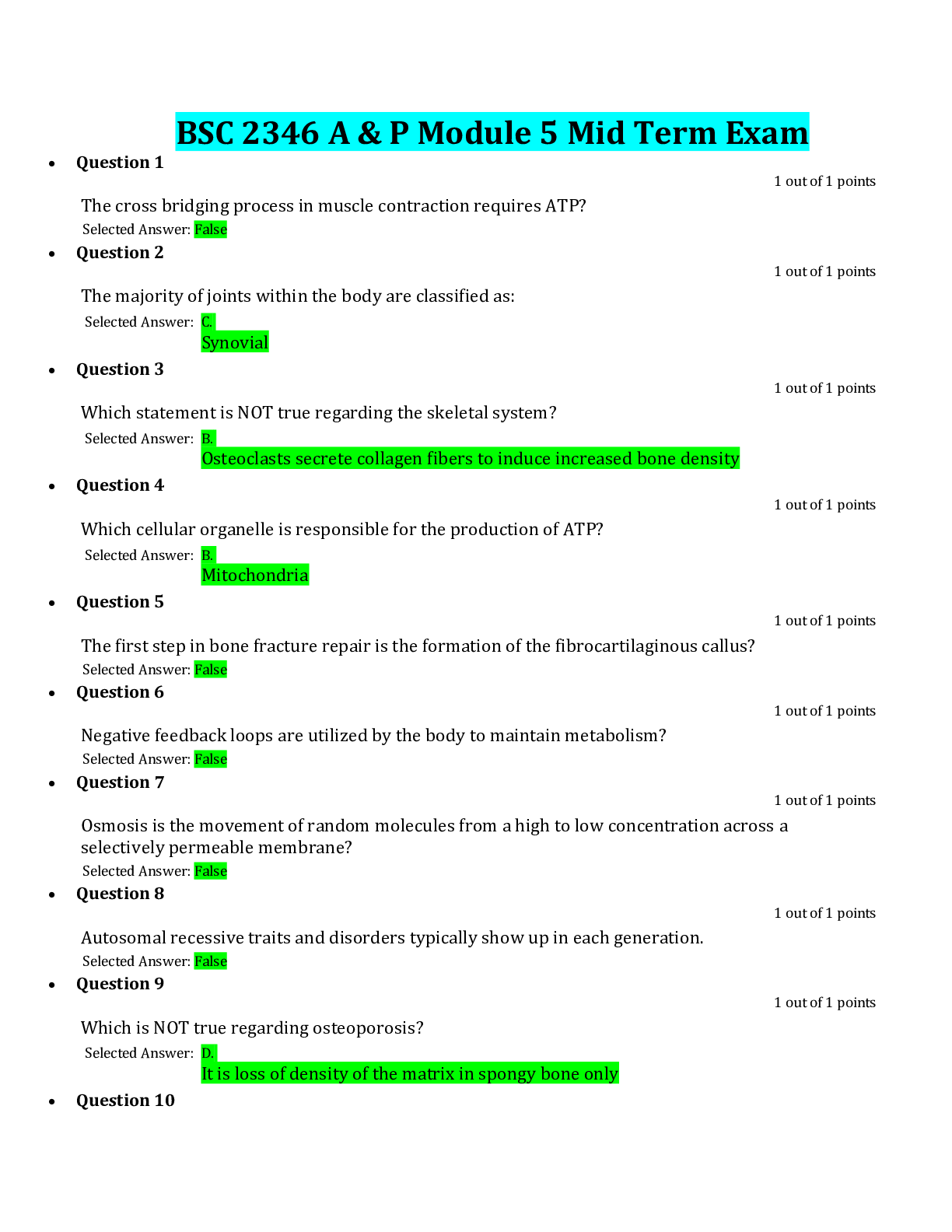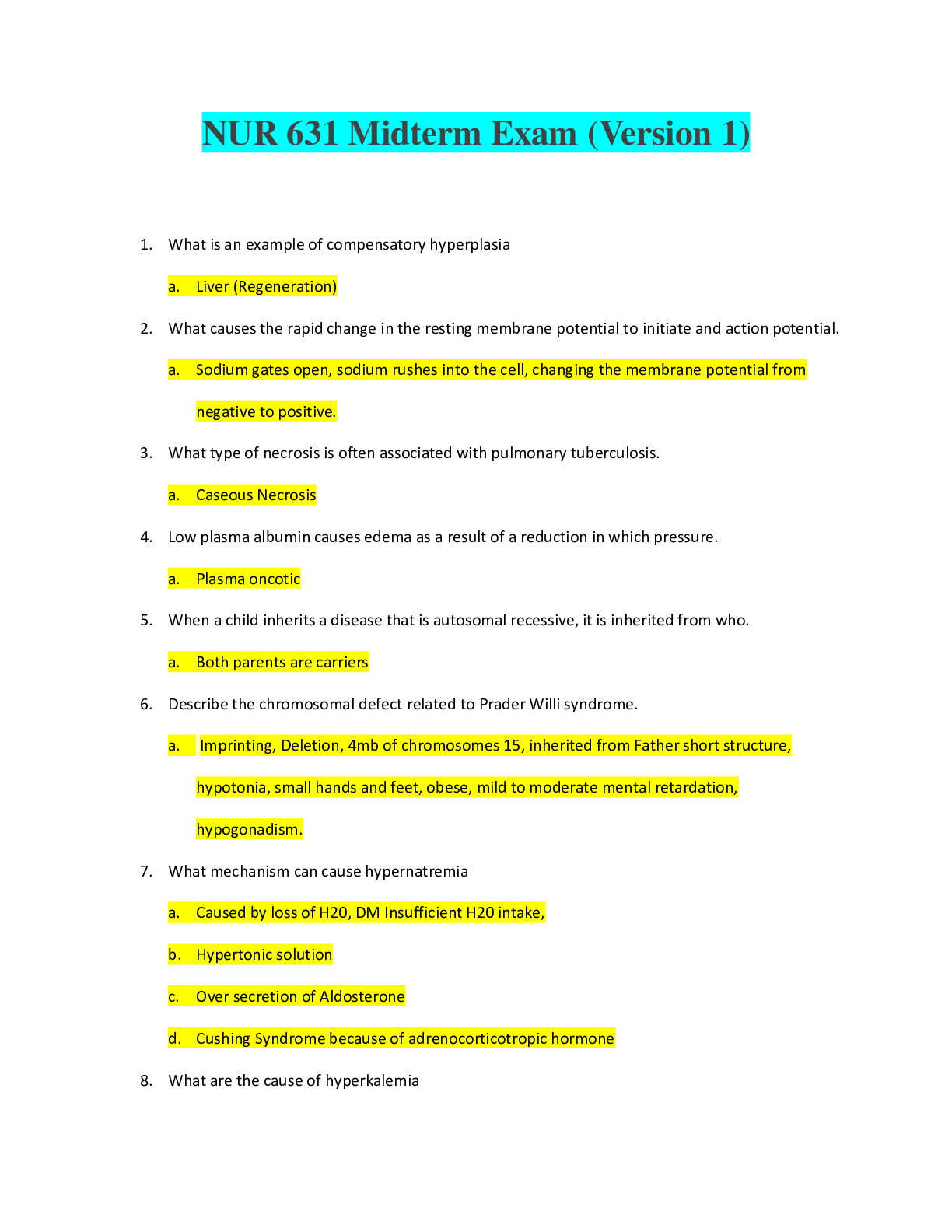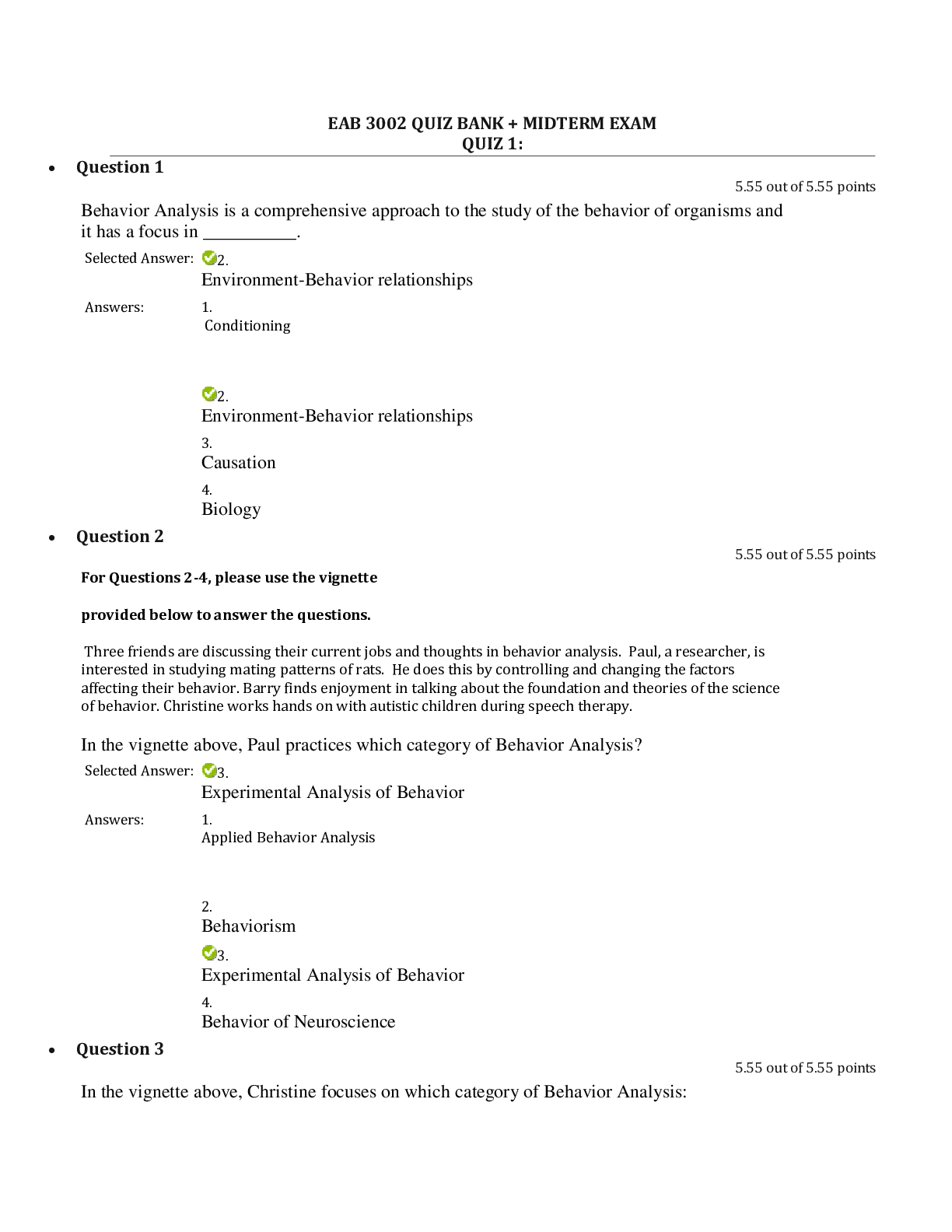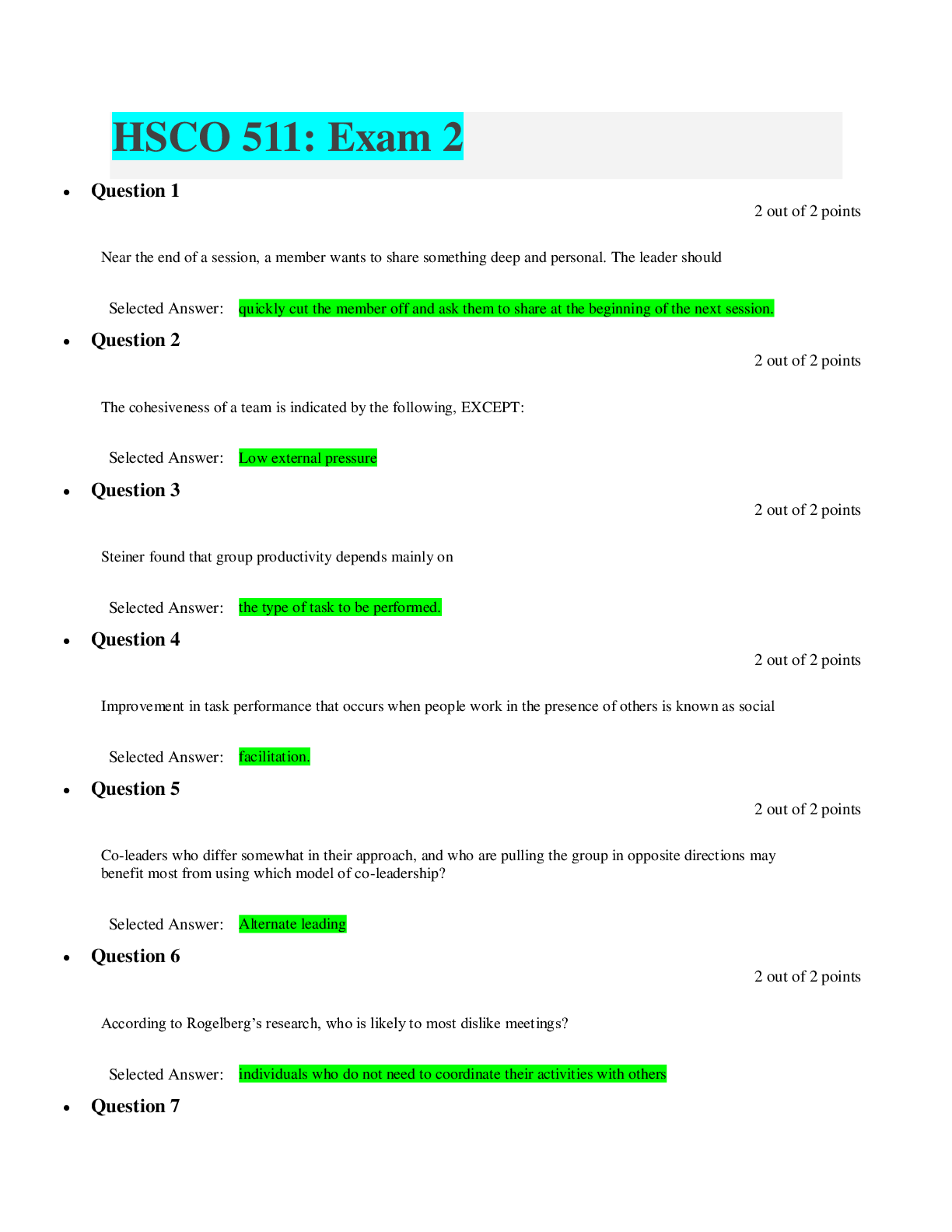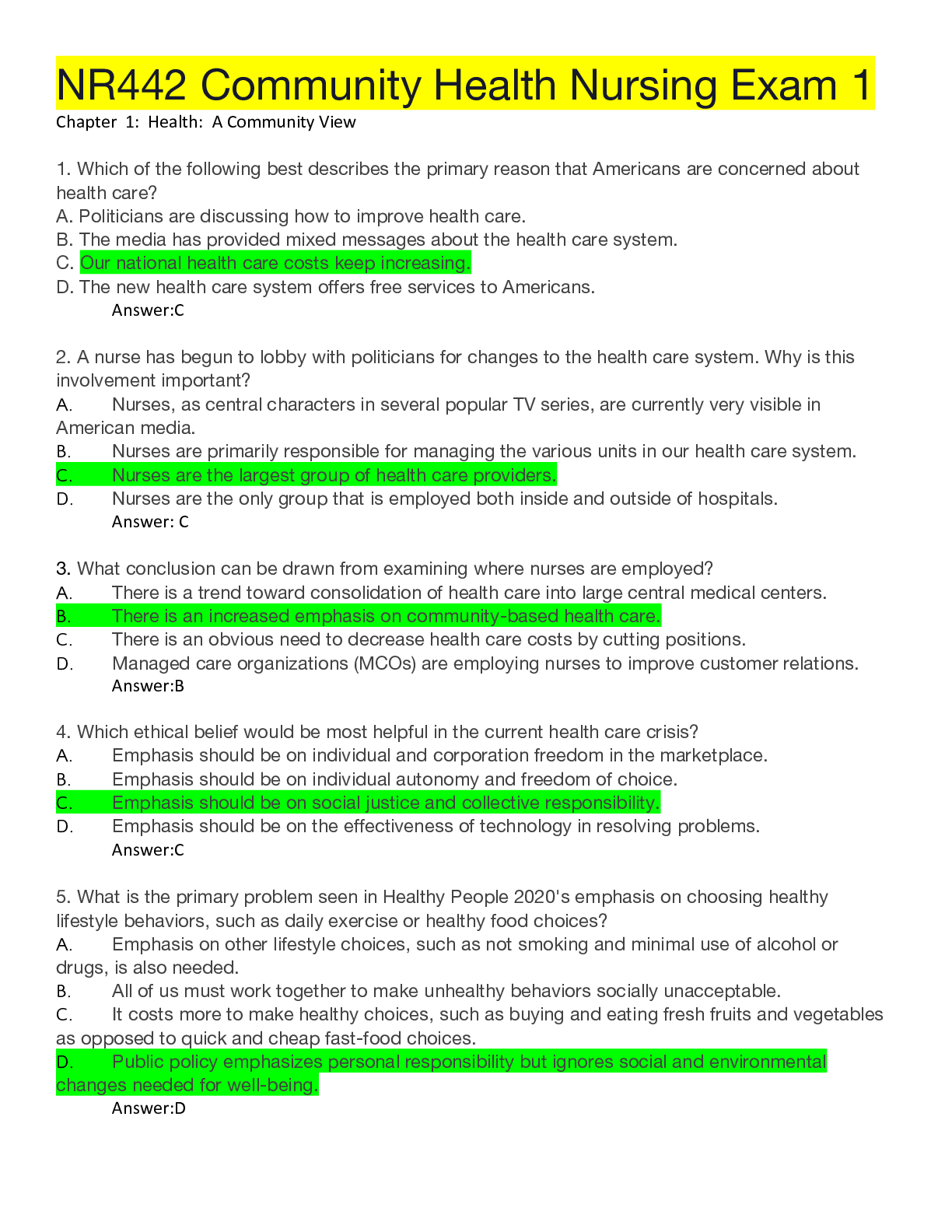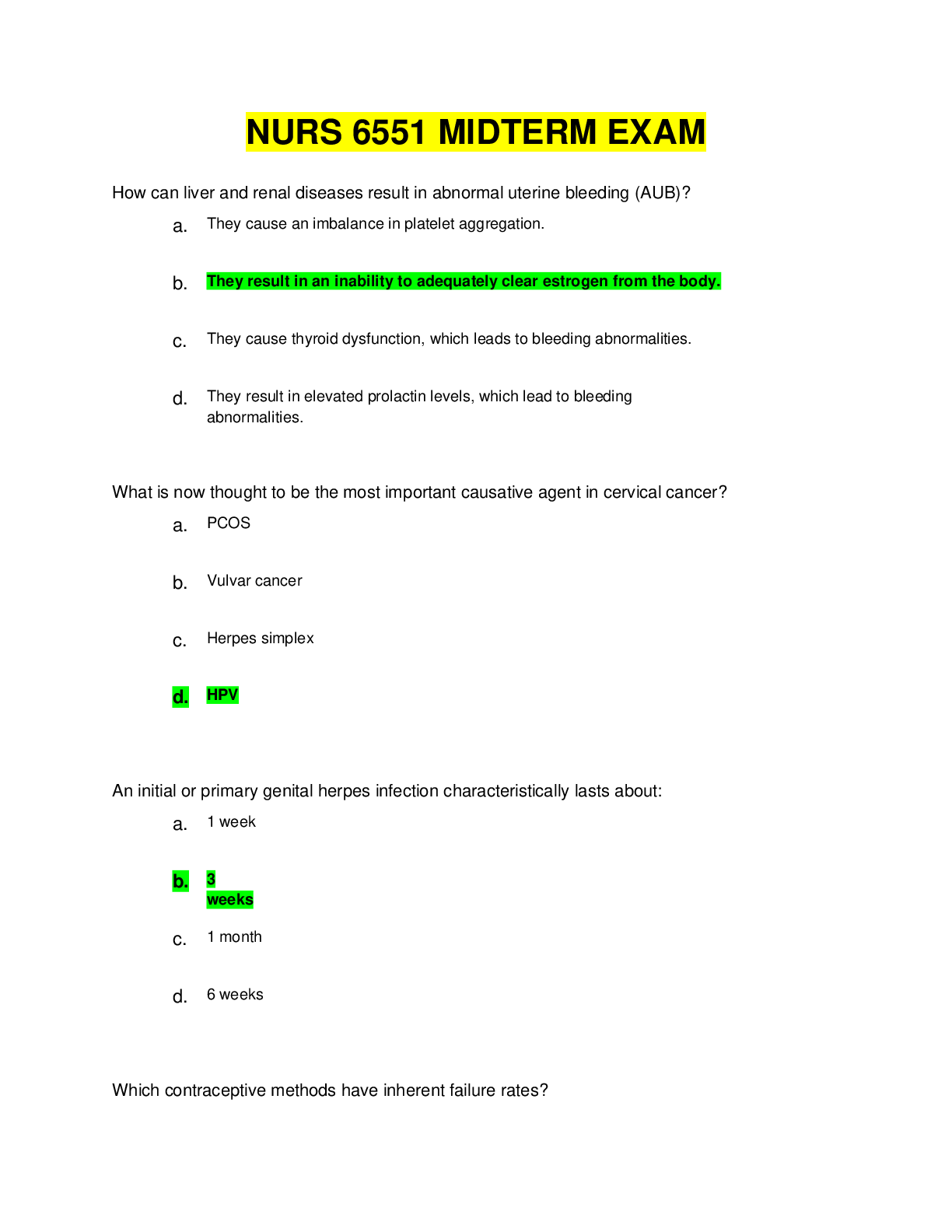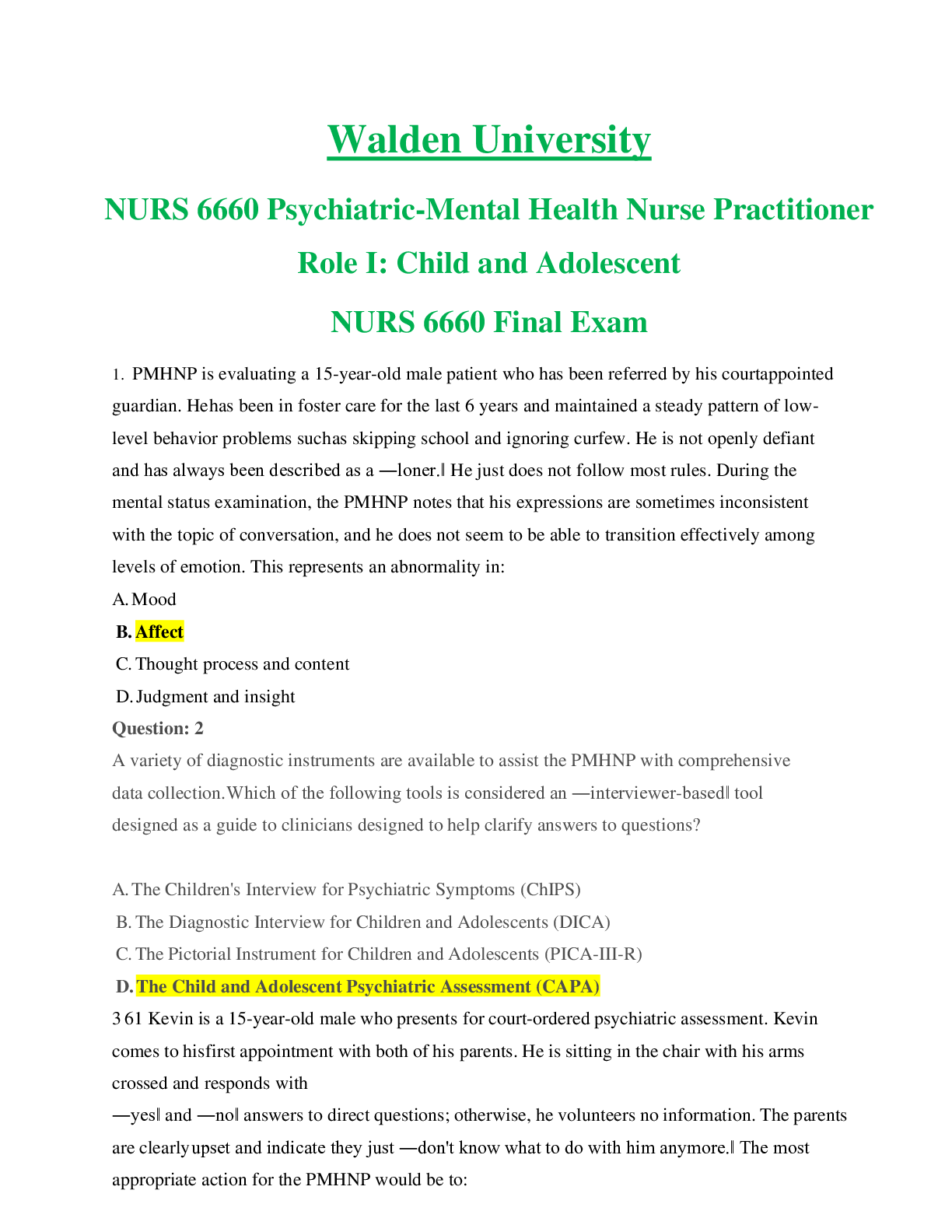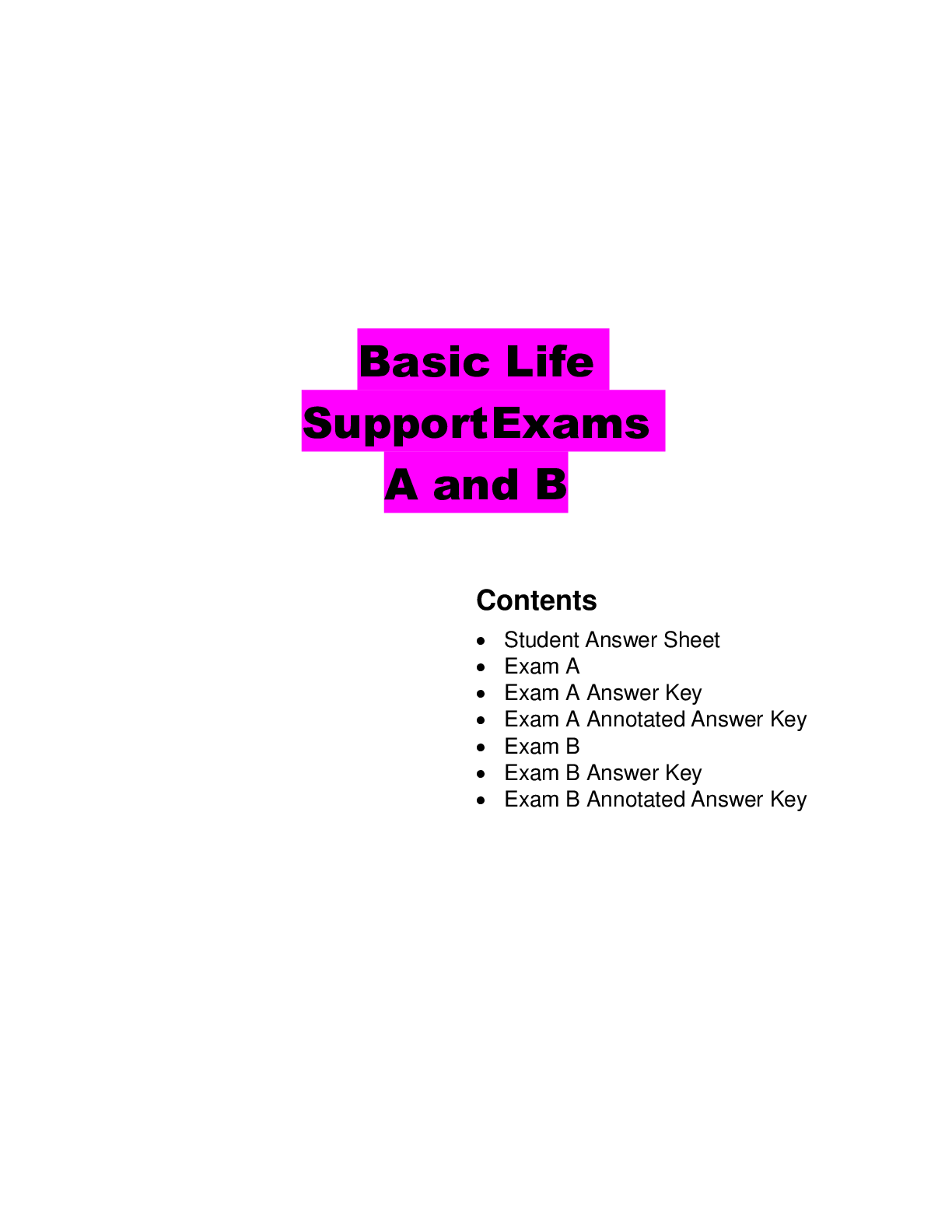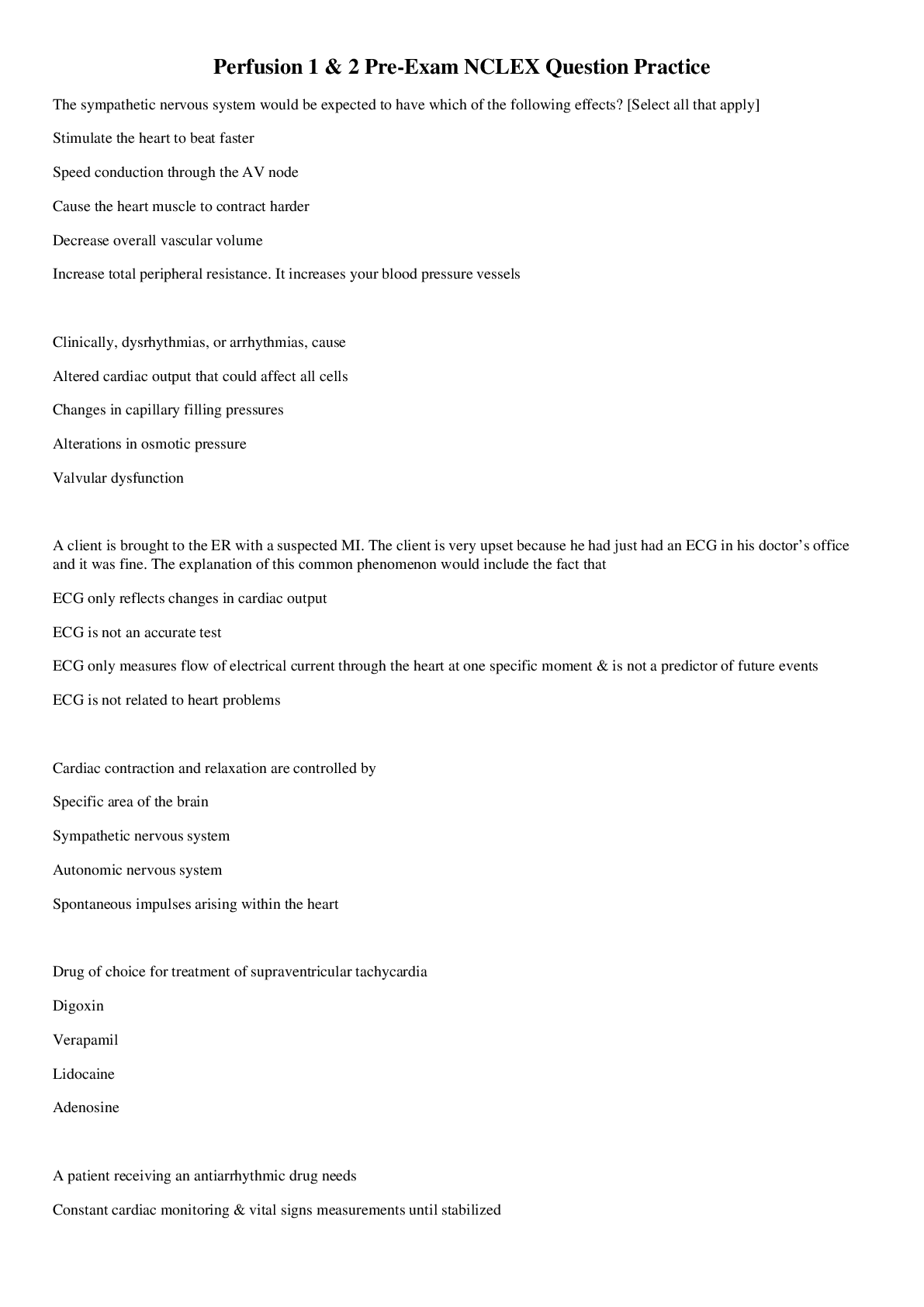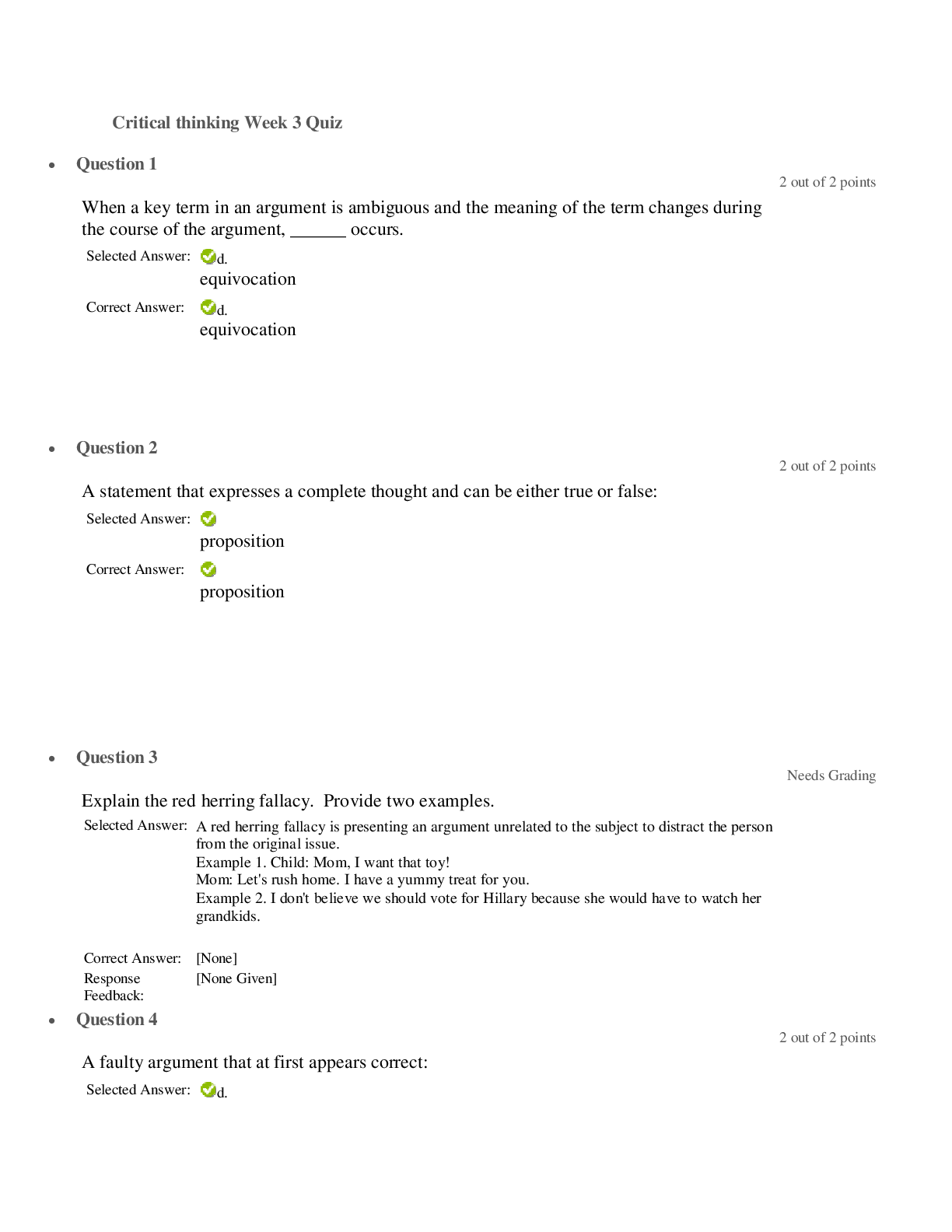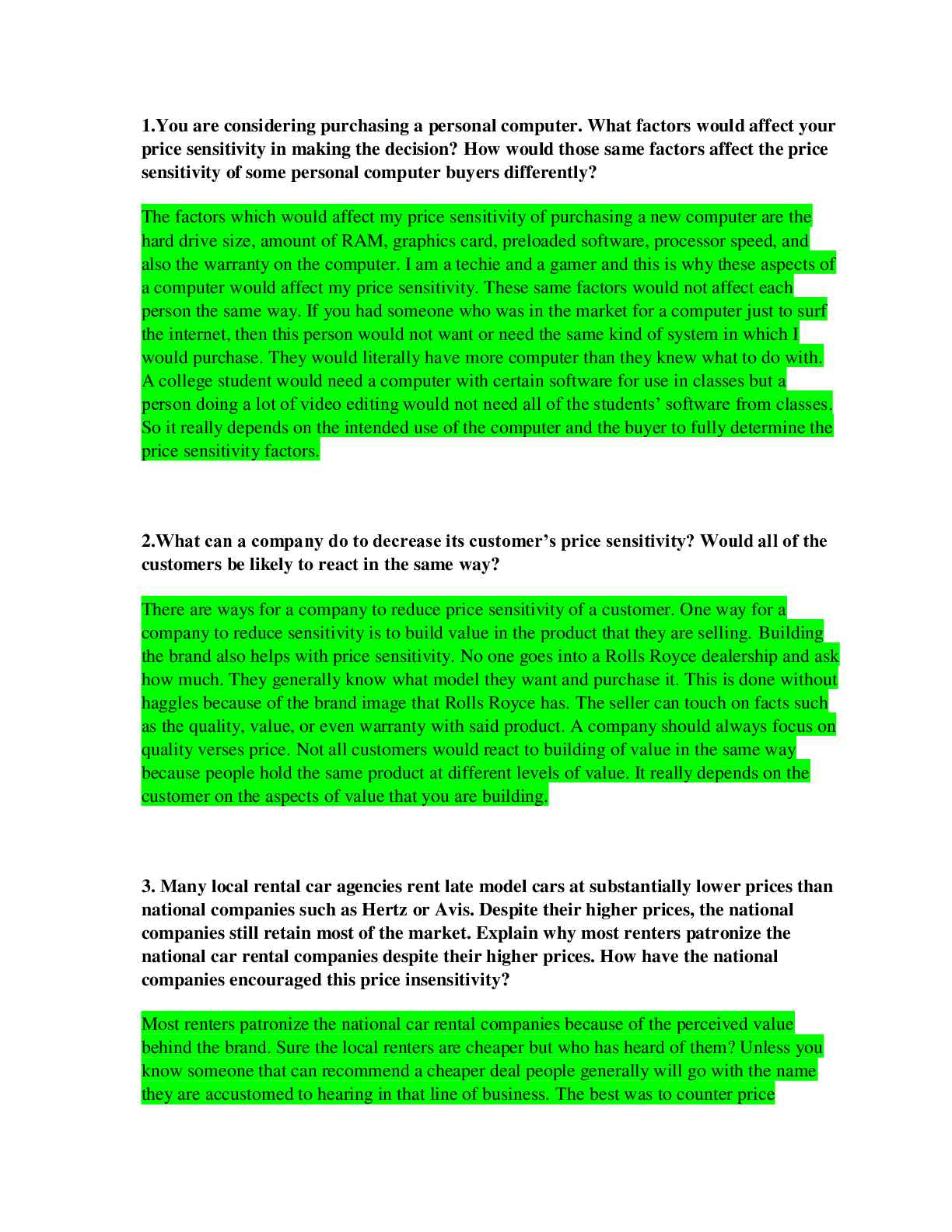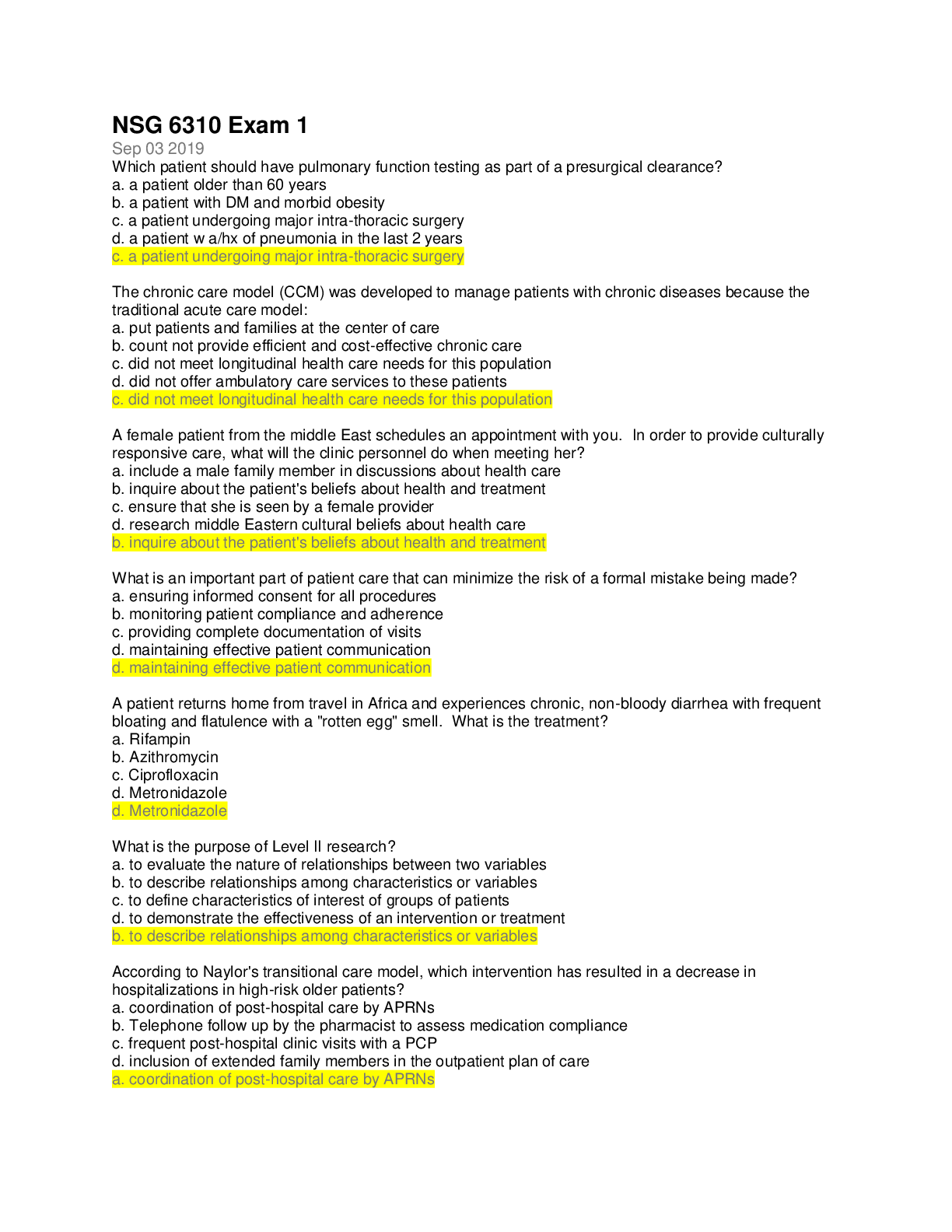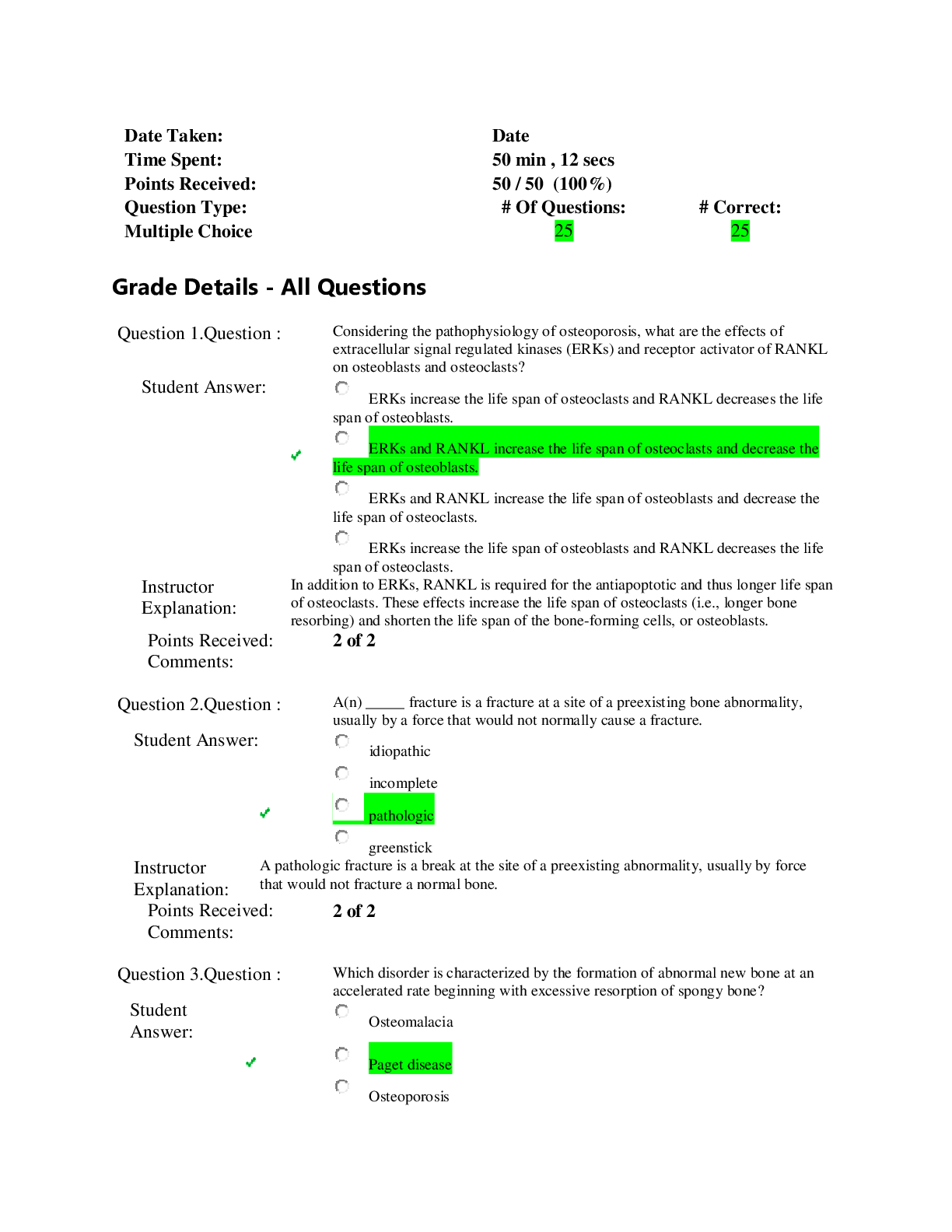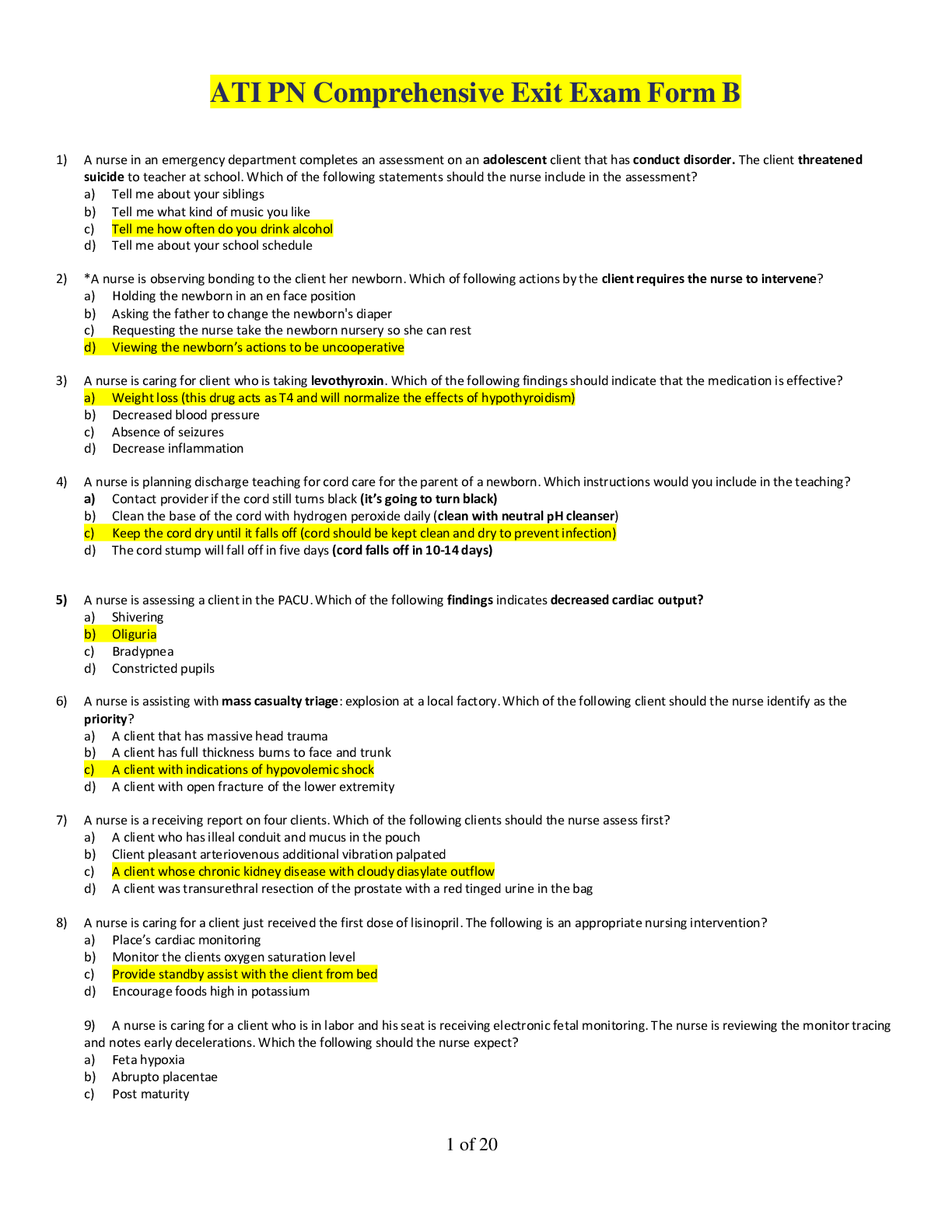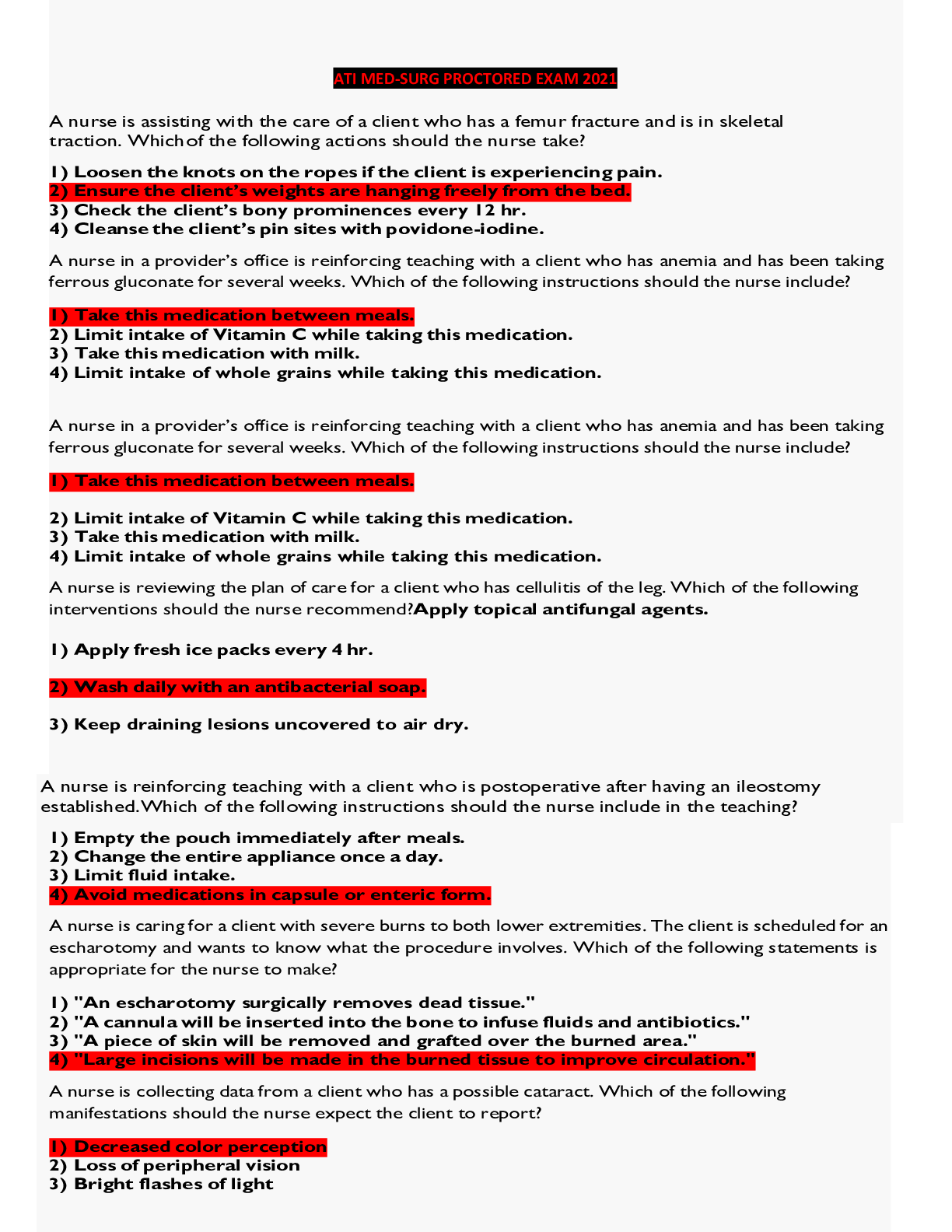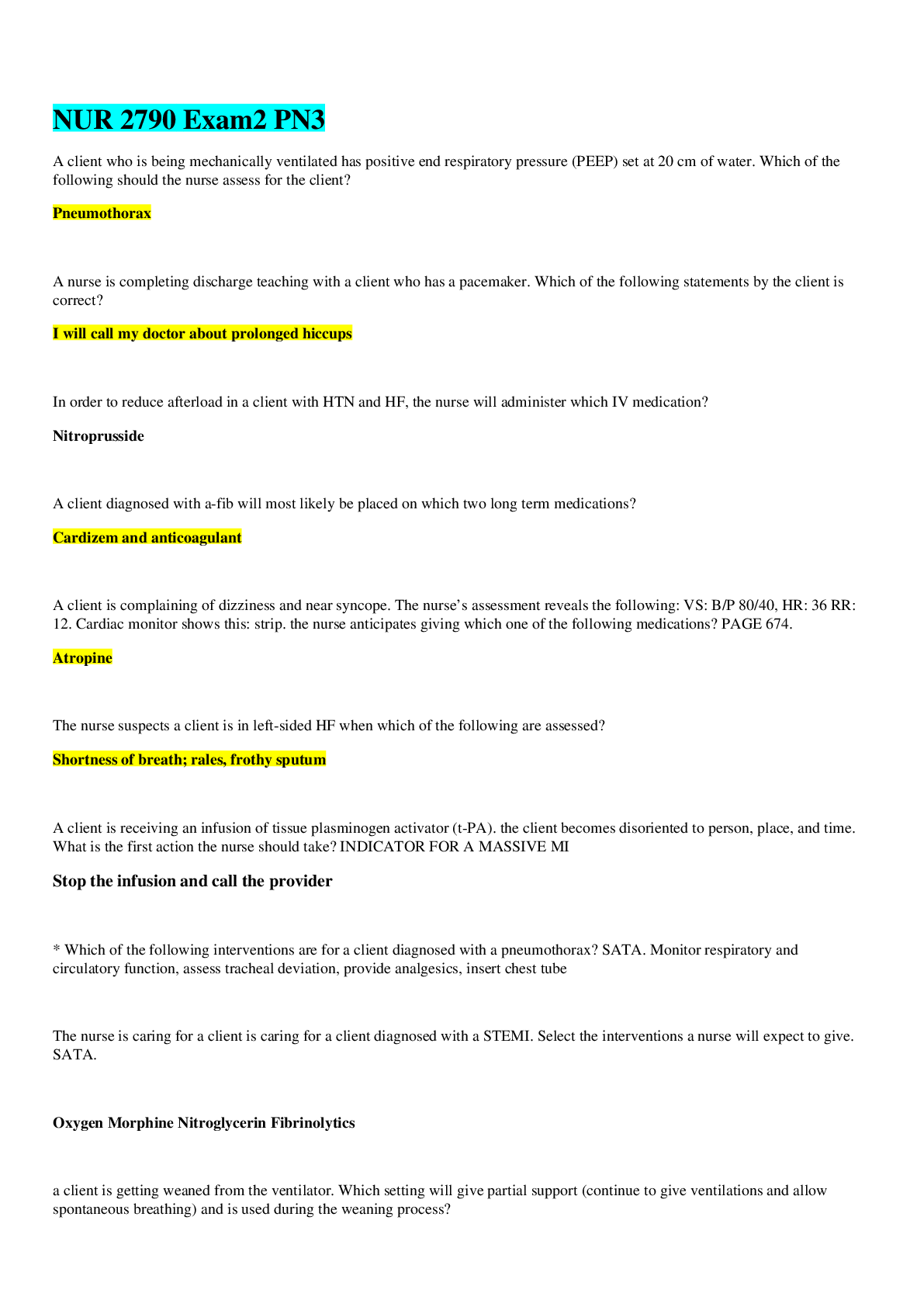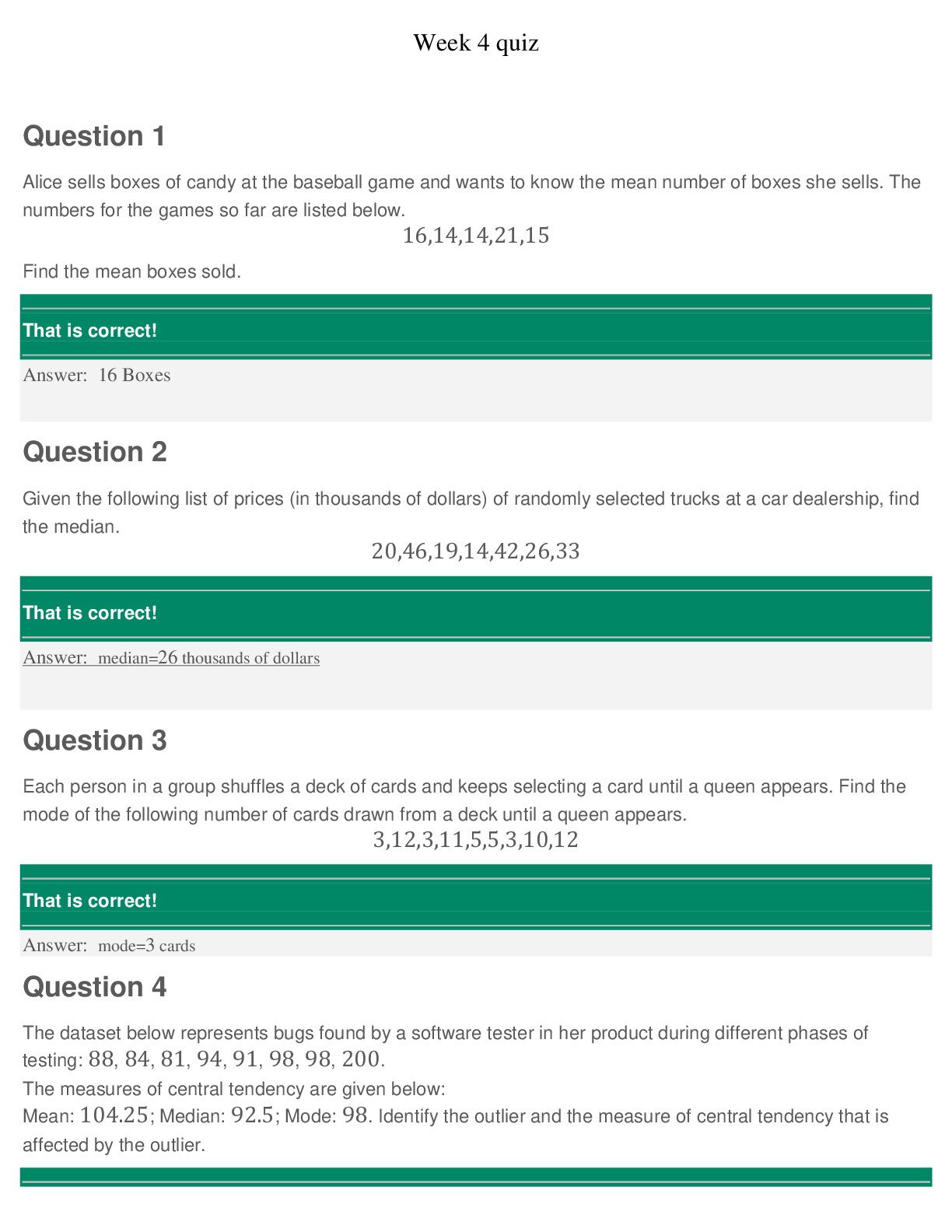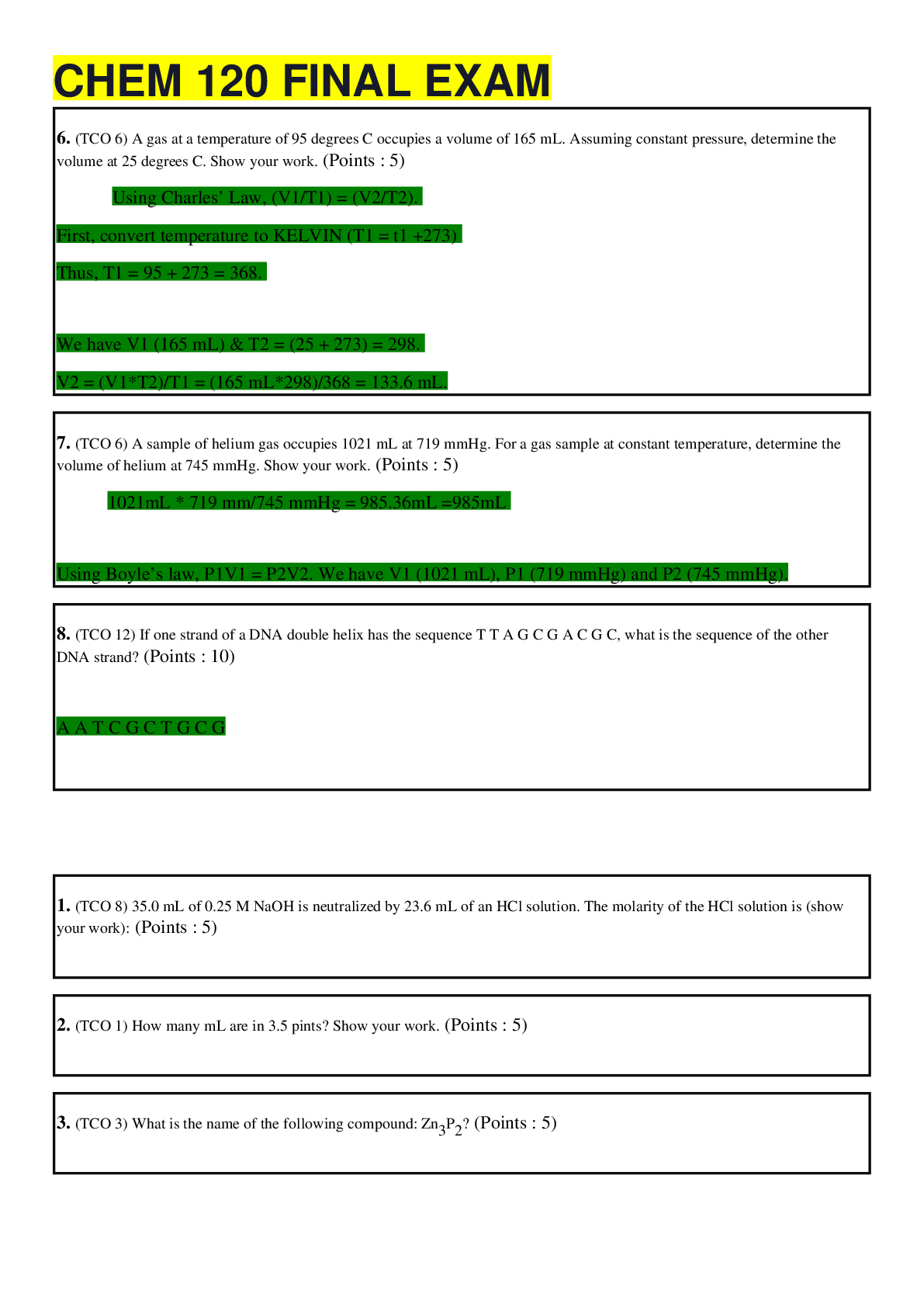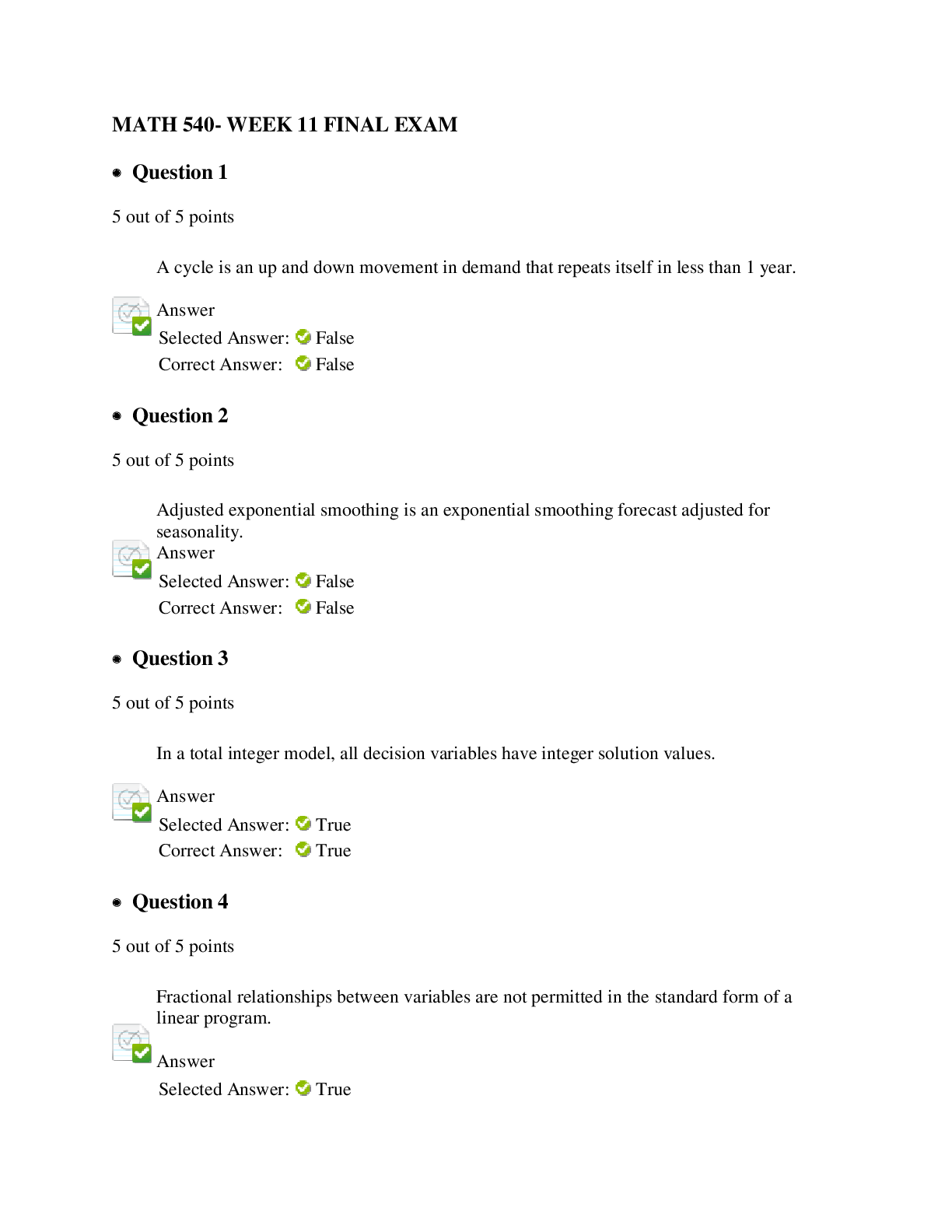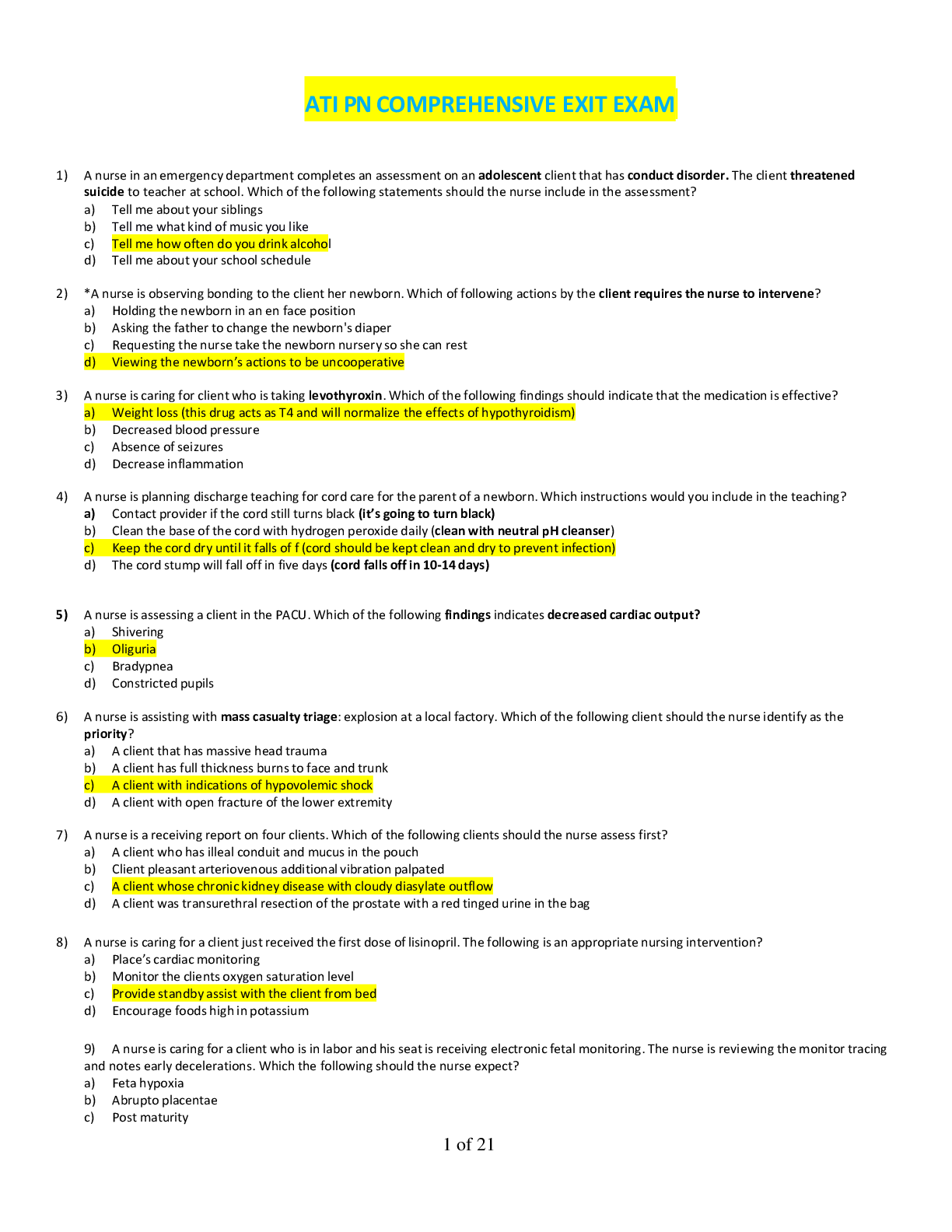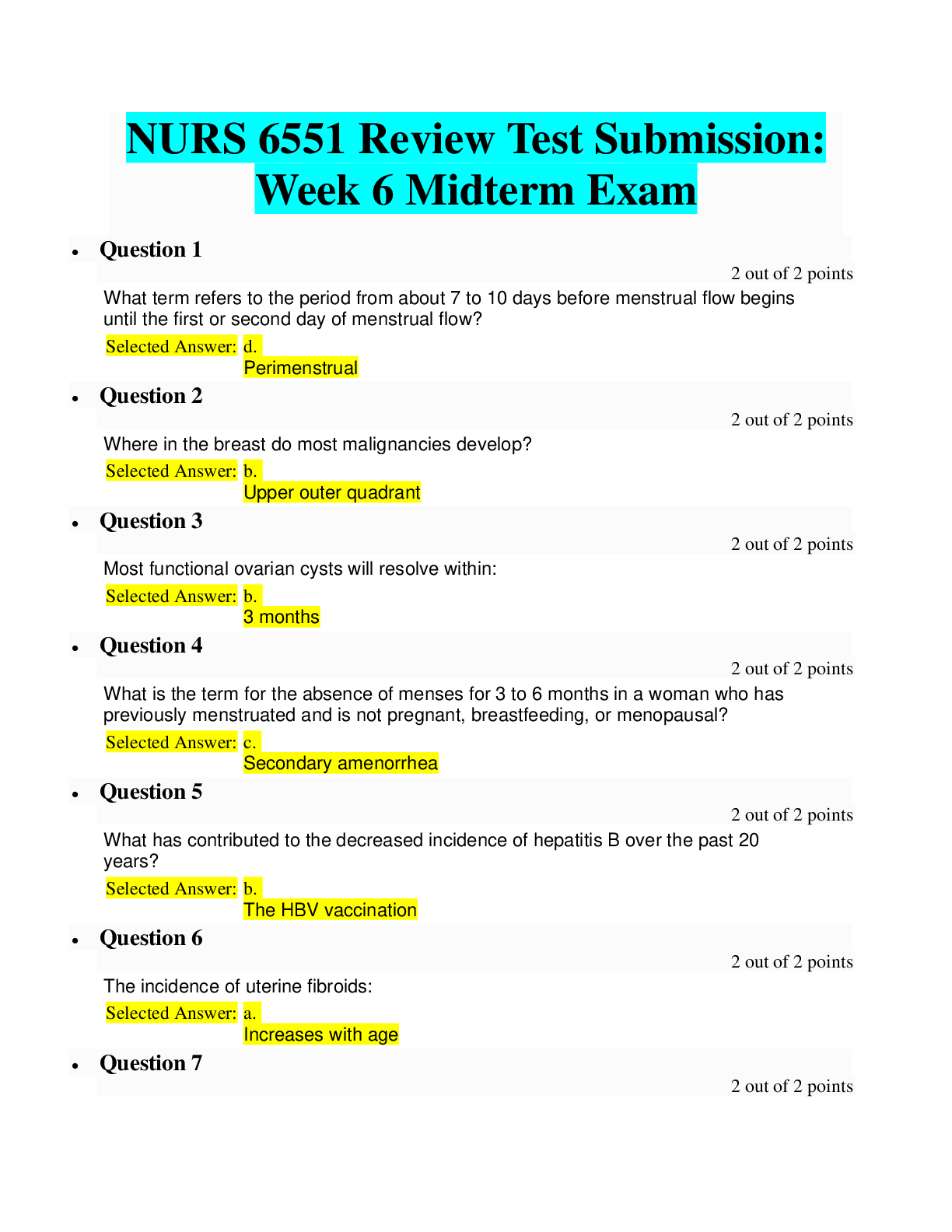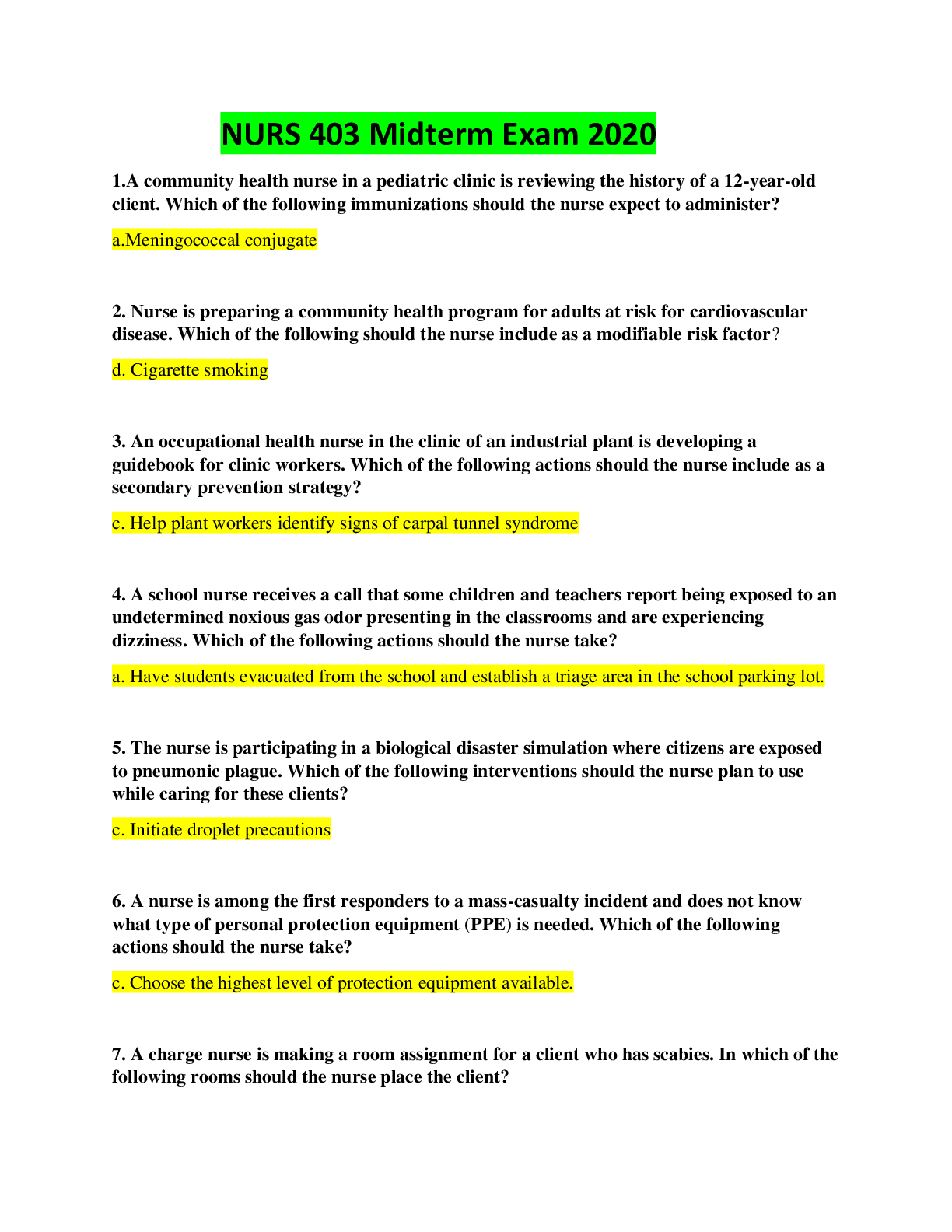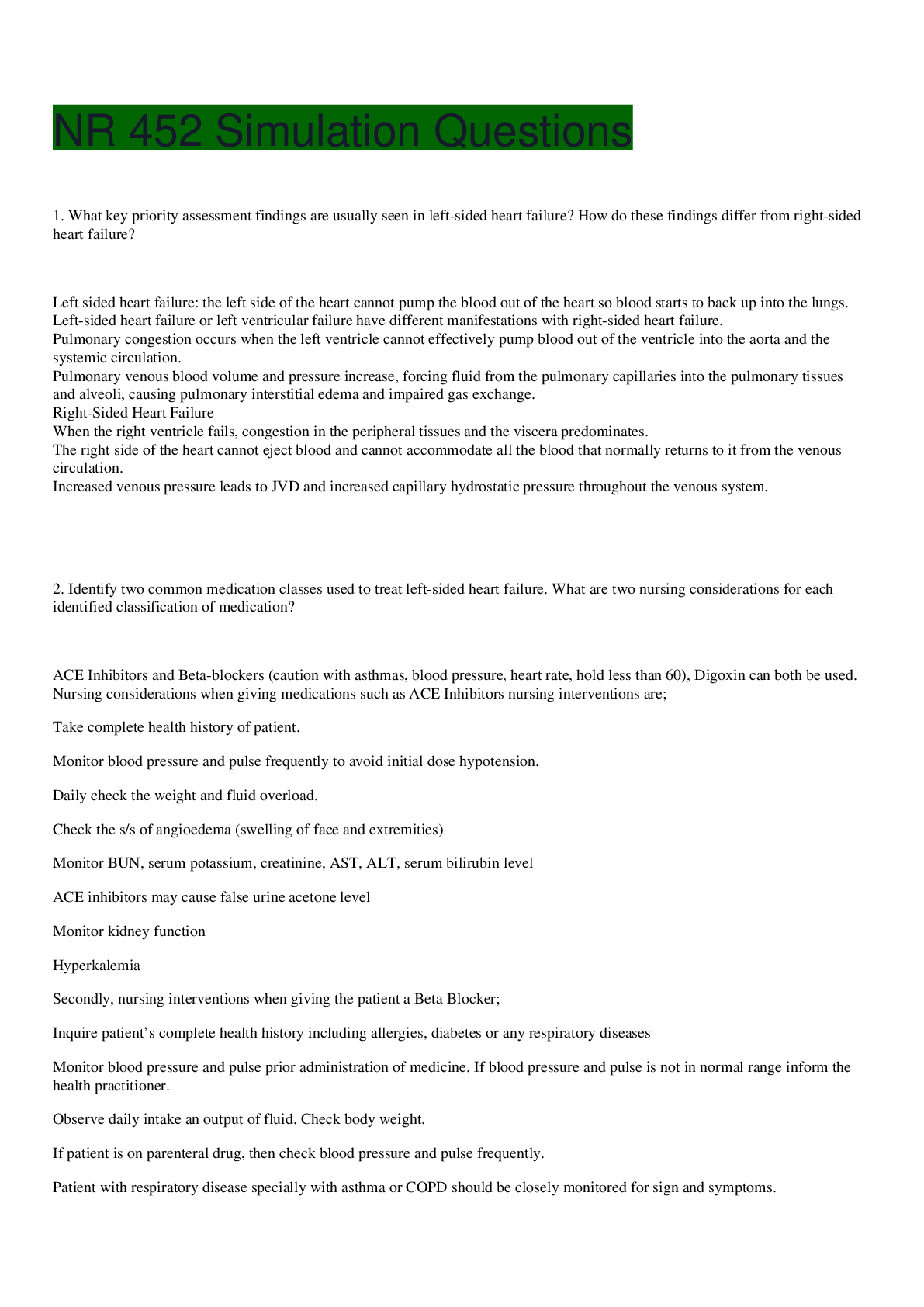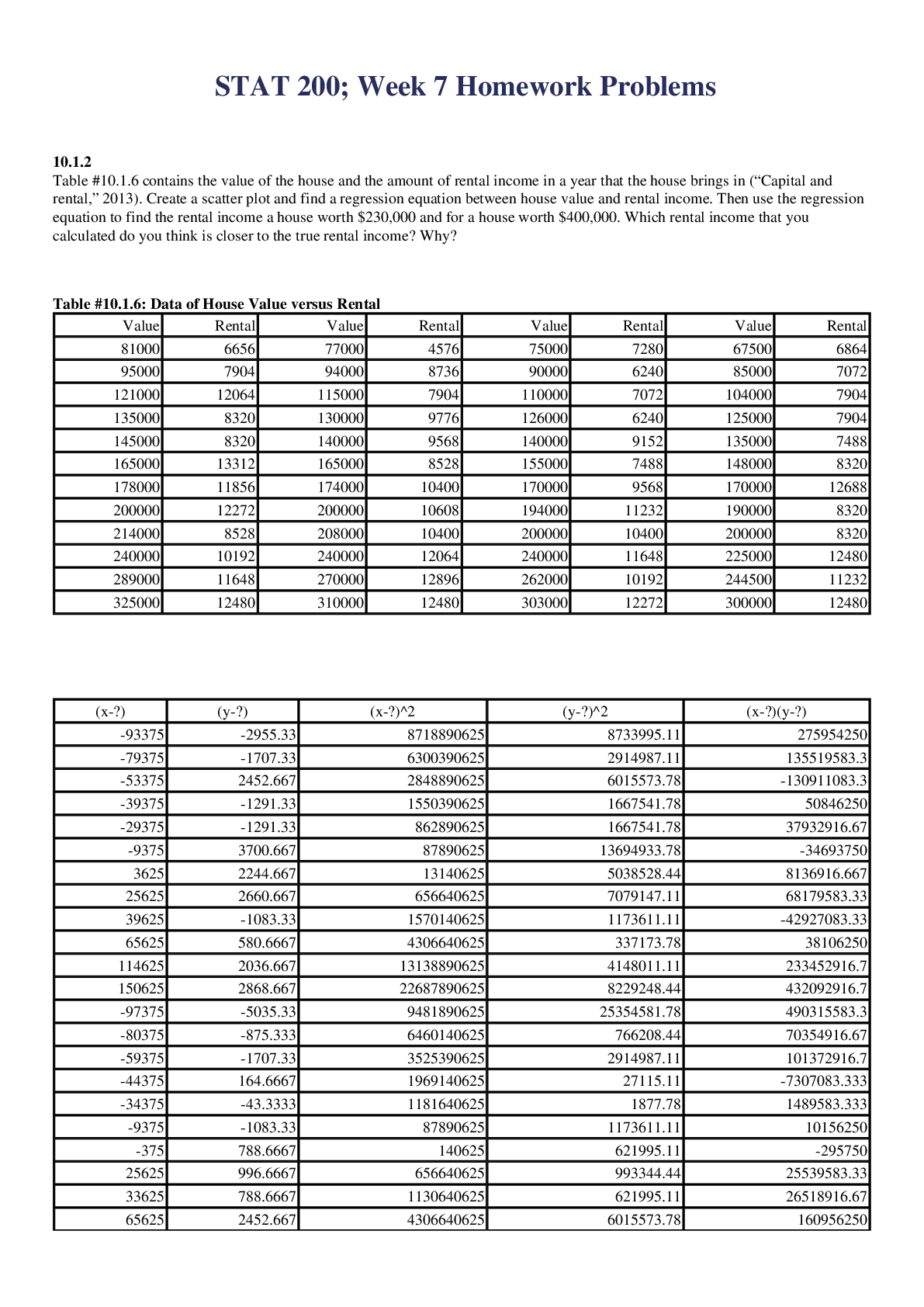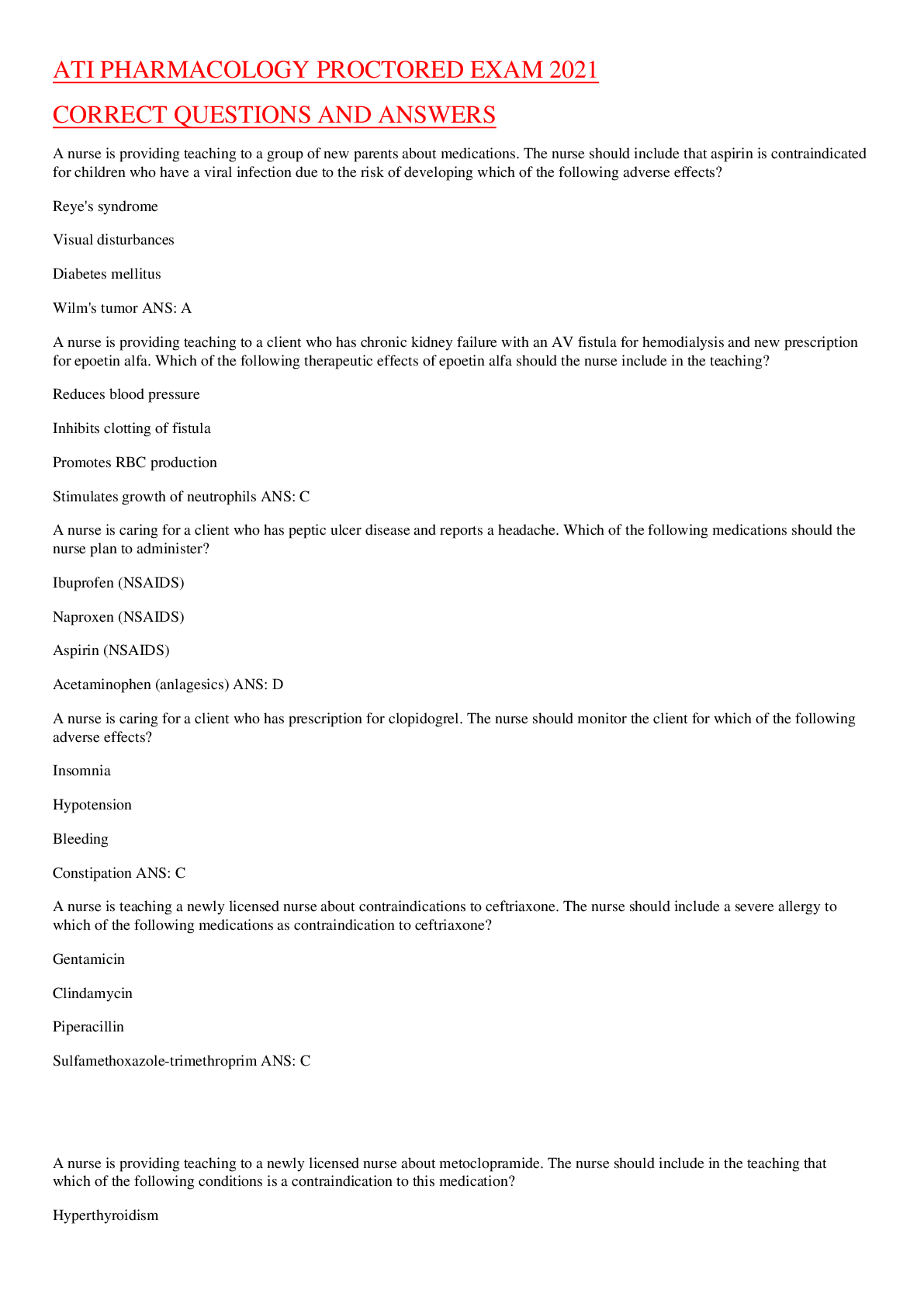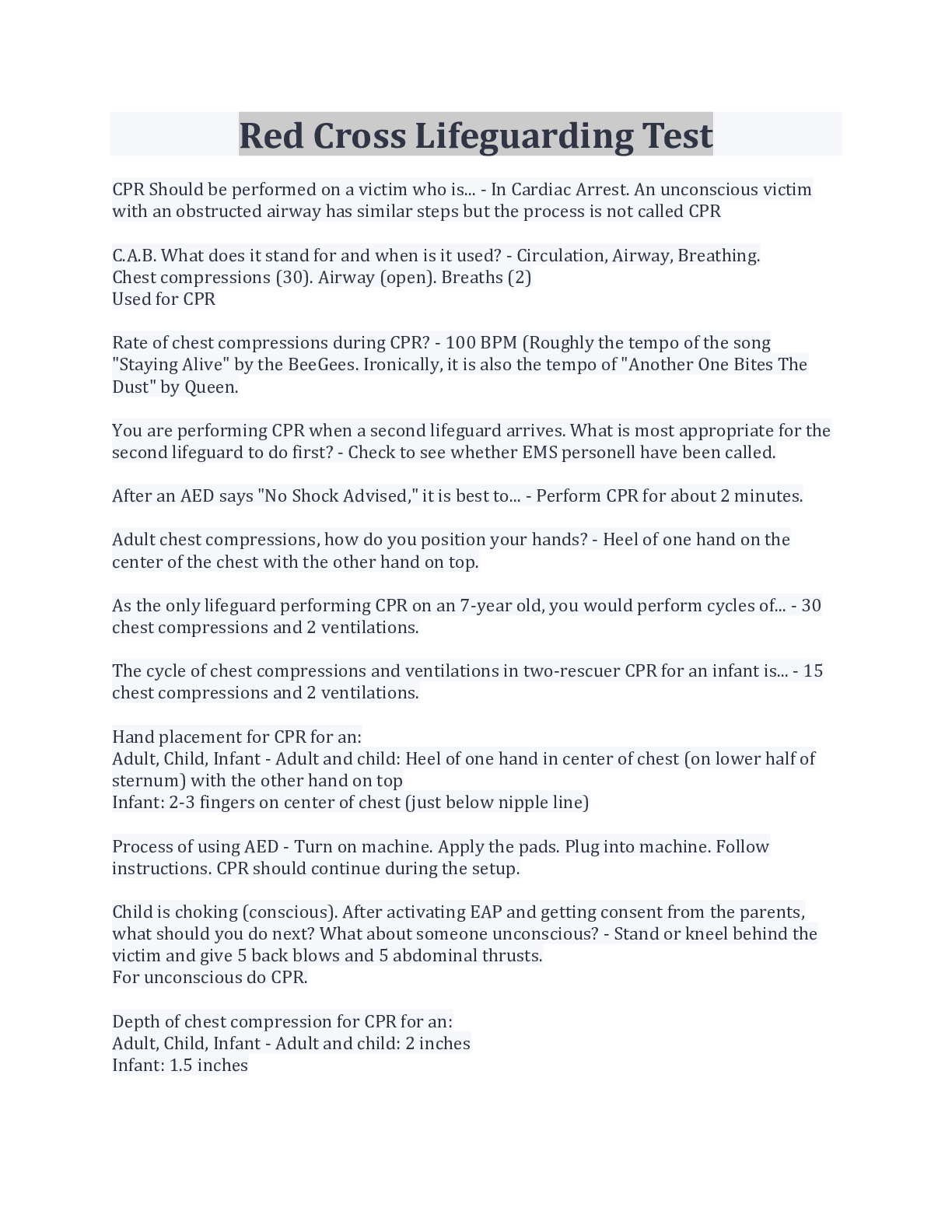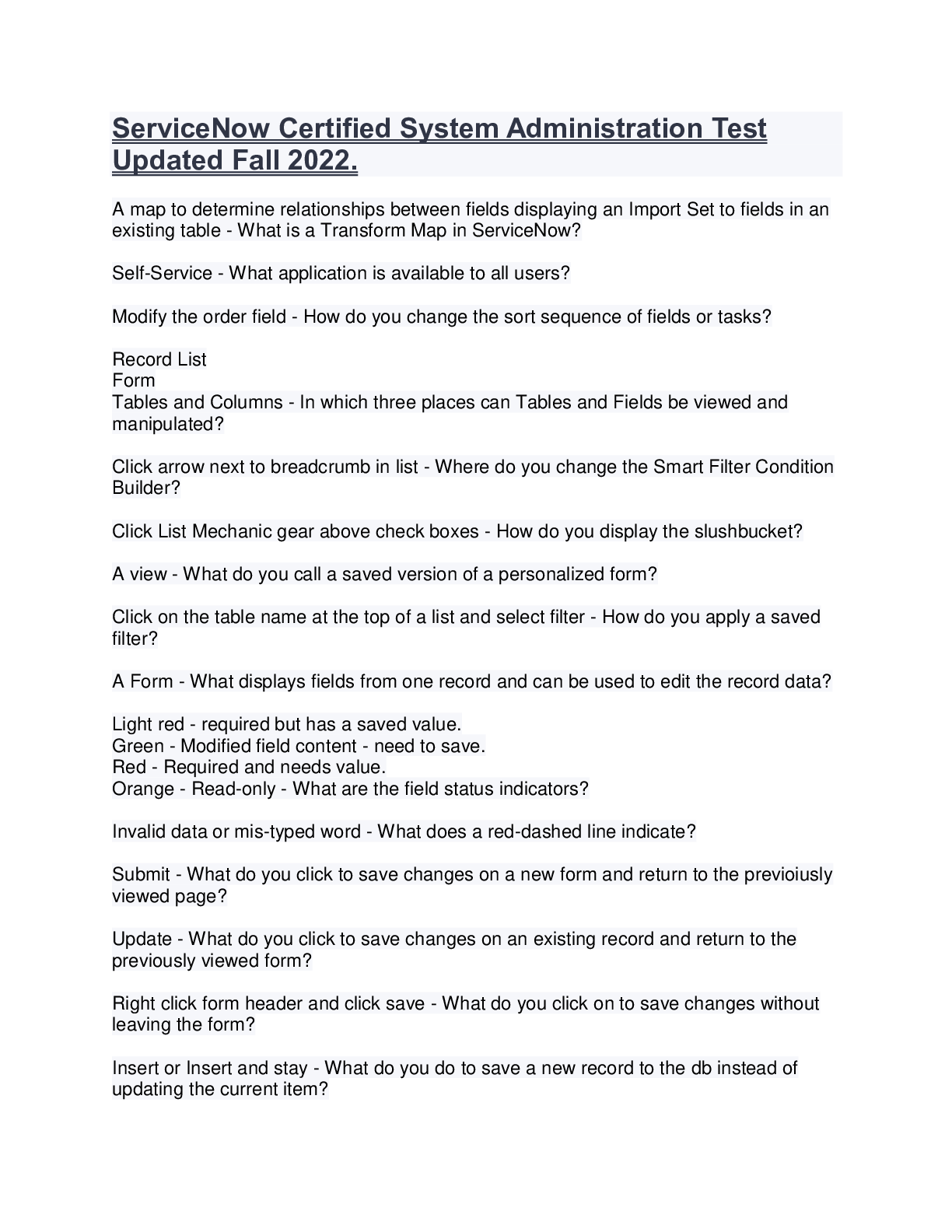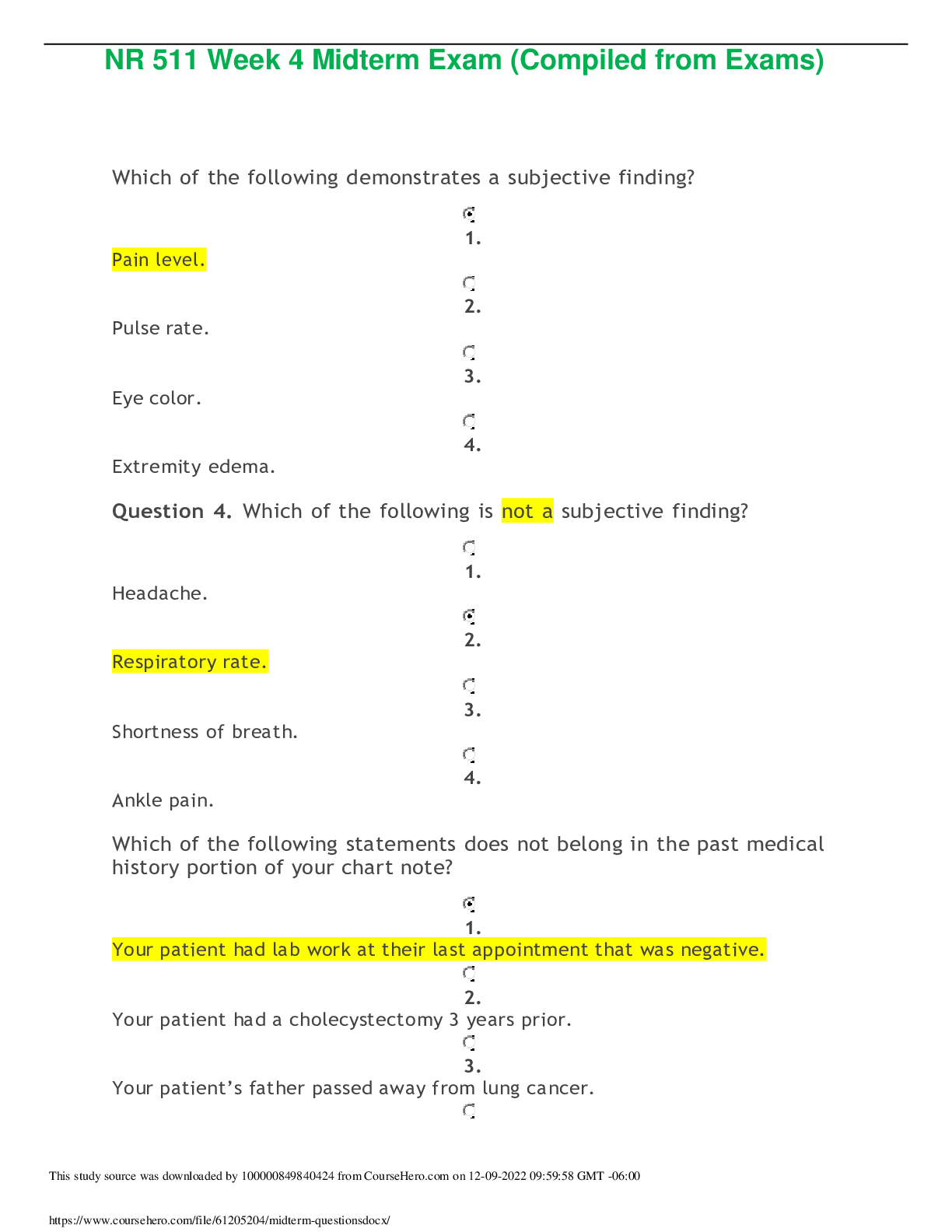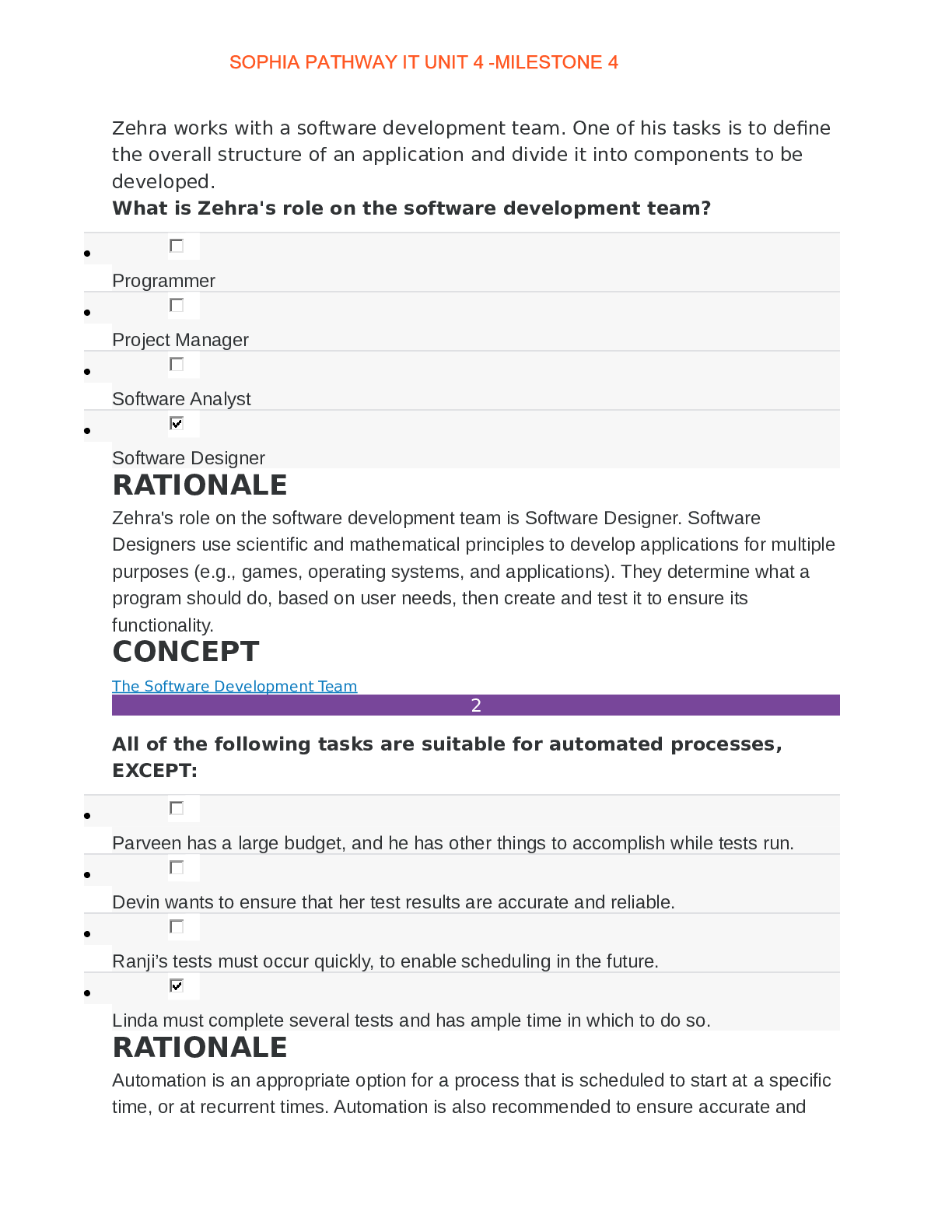Saunders Mental health Exam Questions & Answers (2020) Already Graded A.
Document Content and Description Below
Saunders Mental health Questions & Answers (2020) The nurse is creating a plan of care for a client in a crisis state. When developing the plan, the nurse should consider which factor? The home care... nurse is visiting an older client whose spouse died 6 months ago. Which behaviors by the client indicates effective coping? Select all that apply. Neglecting personal grooming. Looking at old snapshots of family. Participating in a senior citizens program. Visiting the spouse's grave once a month Decorating a wall with the spouse's pictures and awards received A client with a diagnosis of depression who has attempted suicide says to the nurse, "I should have died. I've always been a failure. Nothing ever goes right for me." Which response by the nurse demonstrates therapeutic communication? You have everything to live for." "Why do you see yourself as a failure?". "Feeling like this is all part of being depressed.". "You've been feeling like a failure for a while?" The nurse visits a client at home. The client states, "I haven't slept at all the last couple of nights." Which response by the nurse demonstrates therapeutic communication? I see." "Really?" "You're having difficulty sleeping?" "Sometimes I have trouble sleeping too." A client experiencing disturbed thought processes believes that his food is being poisoned. Which communication technique should the nurse use to encourage the client to eat? Using open-ended questions and silence (encourage the client to express feelings) Sharing personal preference regarding food choices Documenting reasons why the client does not want to eat Offering opinions about the necessity of adequate nutrition The nurse should plan which goals of the termination stage of group development? Select all that apply. The group evaluates the experience. The real work of the group is accomplished. Group interaction involves superficial conversation. Group members become acquainted with one another. Some structuring of group norms, roles, and responsibilities takes place. The group explores members' feelings about the group and the impending separation. A client diagnosed with terminal cancer says to the nurse, "I'm going to die, and I wish my family would stop hoping for a cure! I get so angry when they carry on like this. After all, I'm the one who's dying." Which response by the nurse is therapeutic? Have you shared your feelings with your family?" "I think we should talk more about your anger with your family." "You're feeling angry that your family continues to hope for you to be cured?" "You are probably very depressed, which is understandable with such a diagnosis." On review of the client's record, the nurse notes that the admission was voluntary. Based on this information, the nurse plans care anticipating which client behavior? Fearfulness regarding treatment measures Anger and aggressiveness directed toward others An understanding of the pathology and symptoms of the diagnosis. A willingness to participate in the planning of the care and treatment plan When reviewing the admission assessment, the nurse notes that a client was admitted to the mental health unit involuntarily. Based on this type of admission, the nurse should provide which intervention for this client? Monitor closely for harm to self or others. Assist in completing an application for admission. Supply the client with written information about his or her mental illness. Provide an opportunity for the family to discuss why they felt the admission was needed. When a client is admitted to an inpatient mental health unit with the diagnosis of anorexia nervosa, a cognitive behavioral approach is used as part of the treatment plan. The nurse plans care based on which purpose of this approach? Providing a supportive environment Examining intrapsychic conflicts and past issues Emphasizing social interaction with clients who withdraw Helping the client to examine dysfunctional thoughts and beliefs A client is preparing to attend a Gamblers Anonymous meeting for the first time. The nurse should tell the client that which is the first step in this 12-step program? Admitting to having a problem. Substituting other activities for gambling. Stating that the gambling will be stopped. Discontinuing relationships with people who gamble The nurse in the mental health unit plans to use which therapeutic communication techniques when communicating with a client? Select all that apply. Restating Listening Asking the client "Why?". Maintaining neutral responses Providing acknowledgment and feedback Giving advice and approval or disapproval What is the most appropriate nursing action to help manage a manic client who is monopolizing a group therapy session? Ask the client to leave the group for this session only. Refer the client to another group that includes other manic clients. Tell the client to stop monopolizing in a firm but compassionate manner. Thank the client for the input, but inform the client that others now need a chance to contribute. A client is participating in a therapy group and focuses on viewing all team members as equally important in helping the clients to meet their goals. The nurse is implementing which therapeutic approach? Milieu therapy. Interpersonal therapy. Behavior modification. Support group therapy The nurse is working with a client who despite making a heroic effort was unable to rescue a neighbor trapped in a house fire. Which client-focused action should the nurse engage in during the working phase of the nurse-client relationship? Exploring the client's ability to function Exploring the client's potential for self-harm. Inquiring about the client's perception or appraisal of why the rescue was unsuccessful. Inquiring about and examining the client's feelings for any that may block adaptive coping A client says to the nurse, "The federal guards were sent to kill me." Which is the best response by the nurse to the client's concern? I don't believe this is true." "The guards are not out to kill you." "Do you feel afraid that people are trying to hurt you?". "What makes you think the guards were sent to hurt you?" A client diagnosed with delirium becomes disoriented and confused at night. Which intervention should the nurse implement initially? Move the client next to the nurses' station. Use an indirect light source and turn off the television. Keep the television and a soft light on during the night. Play soft music during the night, and maintain a well-lit room. A client is admitted to the mental health unit with a diagnosis of depression. The nurse should develop a plan of care for the client that includes which intervention? Encouraging quiet reading and writing for the first few days. Identification of physical activities that will provide exercise No socializing activities, until the client asks to participate in milieu A structured program of activities in which the client can participate When planning the discharge of a client with chronic anxiety, the nurse directs the goals at promoting a safe environment at home. Which is the most appropriate maintenance goal? Suppressing feelings of anxiety Identifying anxiety-producing situations Continuing contact with a crisis counselor. Eliminating all anxiety from daily situations A client is unwilling to go to his church because his ex-girlfriend goes there and he feels that she will laugh at him if she sees him. Because of this hypersensitivity to a reaction from her, the client remains homebound. The home care nurse develops a plan of care that addresses which personality disorder? Avoidant Borderline. Schizotypal. Obsessive-compulsive The nurse is conducting a group therapy session. During the session, a client diagnosed with mania consistently disrupts the group's interactions. Which intervention should the nurse initially implement? Setting limits on the client's behavior. Asking the client to leave the group session. Asking another nurse to escort the client out of the group session. Telling the client that they will not be able to attend any future group sessions A client is admitted to a medical nursing unit with a diagnosis of acute blindness after being involved in a hit-and-run accident. When diagnostic testing cannot identify any organic reason why this client cannot see, a mental health consult is prescribed. The nurse plans care based on which condition that should be the focus of this consult? Psychosis. Repression. Conversion disorder. Dissociative disorder A manic client begins to make sexual advances toward visitors in the dayroom. When the nurse firmly states that this is inappropriate and will not be allowed, the client becomes verbally abusive and threatens physical violence to the nurse. Based on the analysis of this situation, which intervention should the nurse implement? 1. Place the client in seclusion for 30 minutes. 2. Tell the client that the behavior is inappropriate. 3. Escort the client to their room, with the assistance of other staff. 4. Tell the client that their telephone privileges are revoked for 24 hours. Which nursing interventions are appropriate for a hospitalized client with mania who is exhibiting manipulative behavior? Select all that apply. 1. Communicate expected behaviors to the client. 2. Ensure that the client knows that they are not in charge of the nursing unit. 3. Assist the client in identifying ways of setting limits on personal behaviors. 4. Follow through about the consequences of behavior in a nonpunitive manner. 5. Enforce rules by informing the client that he/she will not be allowed to attend therapy groups. 6. Have the client state the consequences for behaving in ways that are viewed as unacceptable The nurse observes that a client is pacing, agitated, and presenting aggressive gestures. The client's speech pattern is rapid, and affect is belligerent. Based on these observations, which is the nurse's immediate priority of care? 1. Provide safety for the client and other clients on the unit. 2. Provide the clients on the unit with a sense of comfort and safety. 3. Assist the staff in caring for the client in a controlled environment. 4. Offer the client a less stimulating area in which to calm down and gain control. The nurse is preparing a client with a history of command hallucinations for discharge by providing instructions on interventions for managing hallucinations and anxiety. Which statement in response to these instructions suggests to the nurse that the client has a need for additional information? 1. “My medications will help my anxious feelings.” 2. “I’ll go to support group and talk about what I am feeling.” 3. “I need to get enough sleep and eat well to help prevent feeling anxious.” 4. “When I have command hallucinations, I’ll call a friend and ask him what I should do. The nurse is caring for a client just admitted to the mental health unit and diagnosed with catatonic stupor. The client is lying on the bed in a fetal position. Which is the most appropriate nursing intervention? 1. Ask direct questions to encourage talking. 2. Leave the client alone so as to minimize external stimuli. 3. Sit beside the client in silence with occasional open-ended questions. 4. Take the client into the dayroom with other clients so that they can help watch them The nurse is caring for a client diagnosed with paranoid personality disorder who is experiencing disturbed thought processes. In formulating a nursing plan of care, which best intervention should the nurse include? 1. Increase socialization of the client with peers. 2. Avoid using a whisper voice in front of the client. 3. Begin to educate the client about social supports in the community. 4. Have the client sign a release of information to appropriate parties for assessment purposes. The nurse is planning activities for a client diagnosed with bipolar disorder with aggressive social behavior. Which activity would be most appropriate for this client? 1. Chess 2. Writing 3. Ping pong 4. Basketball The home health nurse visits a client at home and determines that the client is dependent on drugs. During the assessment, which action should the nurse take to plan appropriate nursing care? 1. Ask the client why he started taking illegal drugs. 2. Ask the client about the amount of drug use and its effect. 3. Ask the client how long he thought that he could take drugs without someone finding out. 4. Not ask any questions for fear that the client is in denial and will throw the nurse out of the home. Which interventions are most appropriate for caring for a client in alcohol withdrawal? Select all that apply. 1. Monitor vital signs. 2. Provide a safe environment. 3. Address hallucinations therapeutically. 4. Provide stimulation in the environment. 5. Provide reality orientation as appropriate. 6. Maintain NPO (nothing by mouth) status The nurse determines that the wife of an alcoholic client is benefiting from attending an Al-Anon group if the nurse hears the wife make which statement? 1. “I no longer feel that I deserve the beatings my husband inflicts on me.” 2. “My attendance at the meetings has helped me to see that I provoke my husband’s violence.” 3. “I enjoy attending the meetings because they get me out of the house and away from my husband.” 4. “I can tolerate my husband’s destructive behaviors now that I know they are common among alcoholics. A hospitalized client with a history of alcohol abuse tells the nurse, "I am leaving now. I have to go. I don't want any more treatment. I have things that I have to do right away." The client has not been discharged and is scheduled for an important diagnostic test to be performed in 1 hour. After the nurse discusses the client's concerns with the client, the client dresses and begins to walk out of the hospital room. What action should the nurse take? 1. Call the nursing supervisor. 2. Call security to block all exit areas. 3. Restrain the client until the health care provider (HCP) can be reached. 4. Tell the client that the client cannot return to this hospital again if the client leaves now. The nurse is preparing to perform an admission assessment on a client with a diagnosis of bulimia nervosa. Which assessment findings should the nurse expect to note? Select all that apply. 1. Dental decay 2. Moist, oily skin 3. Loss of tooth enamel 4. Electrolyte imbalances 5. Body weight well below ideal range The nurse is caring for a female client who was admitted to the mental health unit recently for anorexia nervosa. The nurse enters the client's room and notes that the client is engaged in rigorous push-ups. Which nursing action is most appropriate? 1. Interrupt the client and weigh her immediately. 2. Interrupt the client and offer to take her for a walk. 3. Allow the client to complete her exercise program. 4. Tell the client that she is not allowed to exercise rigorously. A client with a diagnosis of anorexia nervosa, who is in a state of starvation, is in a 2-bed room. A newly admitted client will be assigned to this client's room. Which client would be the best choice as a roommate for the client with anorexia nervosa? 1. A client with pneumonia 2. A client undergoing diagnostic tests 3. A client who thrives on managing others 4. A client who could benefit from the client’s assistance at mealtime The nurse is monitoring a hospitalized client who abuses alcohol. Which findings should alert the nurse to the potential for alcohol withdrawal delirium? 1. Hypotension, ataxia, hunger 2. Stupor, lethargy, muscular rigidity 3. Hypotension, coarse hand tremors, lethargy 4. Hypertension, changes in level of consciousness, hallucinations The spouse of a client admitted to the mental health unit for alcohol withdrawal says to the nurse, "I should get out of this bad situation." Which is the most helpful response 1. “Why don’t you tell your spouse about this?” 2. “What do you find difficult about this situation?” 3. “This is not the best time to make that decision.” 4. “I agree with you. You should get out of this situation. by the nurse? A client with anorexia nervosa is a member of a predischarge support group. The client verbalizes that she would like to buy some new clothes, but her finances are limited. Group members have brought some used clothes to the client to replace the client's old clothes. The client believes that the new clothes are much too tight and has reduced her calorie intake to 800 calories daily. How should the nurse evaluate this behavior? 1. Normal behavior 2. Evidence of the client’s disturbed body image 3. Regression as the client is moving toward the community 4. Indicative of the client’s ambivalence about hospital discharge The nurse observes that a client with a potential for violence is agitated, pacing up and down the hallway, and is making aggressive and belligerent gestures at other clients. Which statement would be most appropriate to make to this client? 1. “You need to stop that behavior now.” 2. “You will need to be placed in seclusion.” 3. “You seem restless; tell me what is happening.” 4. “You will need to be restrained if you do not change your behavior.” The nurse is reviewing the assessment data of a client admitted to the mental health unit. The nurse notes that the admission nurse documented that the client is experiencing anxiety as a result of a situational crisis. The nurse plans care for the client, determining that this type of crisis could be caused by which event? 1. Witnessing a murder: An adventitious crisis 2. The death of a loved one 3. A fire that destroyed the client’s home : An adventitious crisis 4. A recent rape episode experienced by the client : An adventitious crisis The nurse is conducting an initial assessment of a client in crisis. When assessing the client's perception of the precipitating event that led to the crisis, which is the most appropriate question? 1. “With whom do you live?” 2. “Who is available to help you?” 3. “What leads you to seek help now?” 4. “What do you usually do to feel better? 42 The nurse is creating a plan of care for a client in a crisis state. When developing the plan, the nurse should consider which factor? 1. A crisis state indicates that the client has a mental illness. 2. A crisis state indicates that the client has an emotional illness. 3. Presenting symptoms in a crisis situation are similar for all clients experiencing a crisis. 4. A client’s response to a crisis is individualized and what constitutes a crisis for one client may not constitute a crisis for another client. The nurse in the emergency department is caring for a young female victim of sexual assault. The client's physical assessment is complete, and physical evidence has been collected. The nurse notes that the client is withdrawn, confused, and at times physically immobile. How should the nurse interpret these behaviors? 1. Signs of depression 2. Reactions to a devastating event 3. Evidence that the client is a high suicide risk 4. Indicative of the need for hospital admission A depressed client on an inpatient unit says to the nurse, "My family would be better off without me." Which is the nurse's best response? 1. “Have you talked to your family about this?” 2. “Every one feels this way when they are depressed.” 3. “You will feel better once your medication begins to work.” 4. “You sound very upset. Are you thinking of hurting yourself?” The nurse has been closely observing a client who has been displaying aggressive behaviors. The nurse observes that the behavior displayed by the client is escalating. Which nursing intervention is most helpful to this client at this time? Select all that apply. 1. Initiate confinement measures. 2. Acknowledge the client’s behavior. 3. Assist the client to an area that is quiet. 4. Maintain a safe distance from the client. 5. Allow the client to take control of the situation Which behavior observed by the nurse indicates a suspicion that a depressed adolescent client may be suicidal? 1. The adolescent gives away a DVD and a cherished autographed picture of a performer. 2. The adolescent runs out of the therapy group, swearing at the group leader, and to her room. 3. The adolescent becomes angry while speaking on the telephone and slams down the receiver. 4. The adolescent gets angry with her roommate when the roommate borrows the client’s clothes without asking. A moderately depressed client who was hospitalized 2 days ago suddenly begins smiling and reporting that the crisis is over. The client says to the nurse, "I'm finally cured." How should the nurse interpret this behavior as a cue to modify the treatment plan? 1. Suggesting a reduction of medication 2. Allowing increased “in-room” activities 3. Increasing the level of suicide precautions 4. Allowing the client off-unit privileges as needed The emergency department nurse is caring for an adult client who is a victim of family violence. Which priority instruction should be included in the discharge instructions? 1. Information regarding shelters 2. Instructions regarding calling the police 3. Instructions regarding self-defense classes 4. Explaining the importance of leaving the violent situation A female victim of a sexual assault is being seen in the crisis center. The client states that she still feels "as though the rape just happened yesterday," even though it has been a few months since the incident. Which is the most appropriate nursing response? 1. “You need to try to be realistic. The rape did not just occur.” 2. “It will take some time to get over these feelings about your rape.” 3. “Tell me more about the incident that causes you to feel like the rape just occurred.” 4. “What do you think that you can do to alleviate some of your fears about being raped again? A client is admitted to the mental health unit after an attempted suicide by hanging. The nurse can best ensure client safety by which action? 1. Requesting that a peer remain with the client at all times 2. Removing the client’s clothing and placing the client in a hospital gown 3. Assigning to the client a staff member who will remain with the client at all times 4. Admitting the client to a seclusion room where all potentially dangerous articles are removed A client is admitted with a recent history of severe anxiety following a home invasion and robbery. During the initial assessment interview, which statement by the client should indicate to the nurse the possible diagnosis of posttraumatic stress disorder? Select all that apply. 1. “I’m afraid of spiders.” 2. “I keep reliving the robbery.” 3. “I see his face everywhere I go.” 4. “I don’t want anything to eat now.” 5. “I might have died over a few dollars in my pocket.” 6. “I have to wash my hands over and over again many times. The emergency department nurse is caring for a client who has been identified as a victim of physical abuse. In planning care for the client, which is the priority nursing action? 1. Adhering to the mandatory abuse-reporting laws 2. Notifying the caseworker of the family situation 3.Removing the client from any immediate danger 4.Obtaining treatment for the abusing family member The nurse assesses a client with the admitting diagnosis of bipolar affective disorder, mania. Which client symptoms require the nurse's immediate action? 1. Incessant talking and sexual innuendoes 2. Grandiose delusions and poor concentration 3. Outlandish behaviors and inappropriate dress 4. Nonstop physical activity and poor nutritional intake The nurse is performing an assessment on a client with dementia. Which piece of data gathered during the assessment indicates a manifestation associated with dementia? 1. Use of confabulation 2. Improvement in sleeping 3. Absence of sundown syndrome 4. Presence of personal hygienic care The nurse is caring for a client with anorexia nervosa. Which behavior is characteristic of this disorder and reflects anxiety management? The nurse is caring for a client with anorexia nervosa. Which behavior is characteristic of this disorder and reflects anxiety management? 1. Engaging in immoral acts 2. Always reinforcing self-approval 3. Observing rigid rules and regulations 4. Having the need always to make the right decision A depressed client verbalizes feelings of low self-esteem and self-worth typified by statements such as "I'm such a failure. I can't do anything right." How should the nurse plan to respond to the client's statement? 1. Reassure the client that things will get better. 2. Tell the client that this is not true and that we all have a purpose in life. 3. Identify recent behaviors or accomplishments that demonstrate the client's skills. 4. Remain with the client and sit in silence; this will encourage the client to verbalize feelings. A client with diabetes mellitus is told that amputation of the leg is necessary to sustain life. The client is very upset and tells the nurse, "This is all my health care provider's fault. I have done everything I've been asked to do!" Which nursing interpretation is best for this situation? 1. An expected coping mechanism 2. An ineffective defense mechanism 3. A need to notify the hospital lawyer 4. An expression of guilt on the part of the client A client experiencing a great deal of stress and anxiety is being taught to use self-control therapy. Which statement by the client indicates a need for further teaching about the therapy? 1. "This form of therapy can be applied to new situations." 2. "An advantage of this technique is that change is likely to last." 3. "Talking to oneself is a basic component of this form of therapy." 4. "This form of therapy provides a negative reinforcement when the stimulus is produced." The nurse is caring for a client who is at risk for suicide. What is the priority nursing action for this client? 1. Provide authority, action, and participation. 2. Display an attitude of detachment, confrontation, and efficiency. 3. Demonstrate confidence in the client's ability to deal with stressors. 4. Provide hope and reassurance that the problems will resolve themselves. A client comes to the emergency department after an assault and is extremely agitated, trembling, and hyperventilating. What is the priority nursing action for this client? 1. Begin to teach relaxation techniques. 2. Encourage the client to discuss the assault. 3. Remain with the client until the anxiety decreases. 4. Place the client in a quiet room alone to decrease stimulation. The nurse is developing a plan of care for a client who was experiencing anxiety after the loss of a job. The client is now verbalizing concerns regarding the ability to meet role expectations and financial obligations. What is the priority nursing problem for this client? 1. Anxiety 2. Unrealistic outlook 3. Lack of ability to cope effectively 4. Disturbances in thoughts and ideas The nurse has developed a plan of care for a client diagnosed with anorexia nervosa. Which client problem would the nurse select as the priority in the plan of care? 1. Disrupted appearance because of weight 2. Inability to feed self because of weakness 3. Pain because of an inflamed gastric mucosa 4. Nutritional imbalance because of lack of intake Which statement made by an unlicensed assistive personnel (UAP) indicates to the registered nurse that the UAP understands the concepts related to suicide? 1. "Discussing suicide with a client is not harmful." 2. "Those clients who talk about suicide never do it." 3. "Depressed clients are the only persons who commit suicide." 4. "A suicide threat is a cry for attention from family and friends." Which client is at greatest risk for committing suicide? 1. A client with metastatic cancer 2. A client with a newly diagnosed cardiac disorder 3. A client who just had an argument with her fiancé 4. A newly divorced client who states she has custody of the children Which statement by the nurse indicates a need for further teaching concerning family violence? 1. "Abusers use fear and intimidation." 2. "Abusers usually have poor self-esteem." 3. "Abusers often are jealous or self-centered." 4. "Abusers are more often from low-income families." Which pre–electroconvulsive therapy intervention will the nurse implement for a hospitalized client? 1. Restrict the client smoking for 12 hours. 2. Enforce nothing by mouth (NPO) status for 16 hours. 3. Limit the client's participation in unit activities for 24 hours. 4. Assure that an electrocardiogram is performed within 24 hours. A nursing student is assisting with the care of a client with a chronic mental illness. The nurse informs the student that a behavior modification approach (operant conditioning) will be used in treatment for the client. Which statement by the student indicates a need for further information about the therapy? 1. "It uses positive reinforcement." 2. "It uses negative reinforcement." 3. "It increases social behaviors in the client." 4. "It increases the level of self-care in the client." The nurse is performing an admission assessment on a client at high risk for suicide. Which assessment question will best elicit data related to this risk? 1. "What are you feeling right now?" 2. "Do you have a plan to commit suicide?" 3. "How many times have you attempted suicide in the past?" 4. "Why were your attempts at suicide unsuccessful in the past?" The nurse in the mental health unit is performing an assessment in a client who has a history of multiple physical complaints involving several organ systems. Diagnostic studies revealed no organic pathology. The care plan developed for this client will reflect that the client is experiencing which disorder? 1. Depression 2. Schizophrenia 3. Somatization disorder 4. Obsessive-compulsive disorder The mental health nurse is meeting with a client who has a long history of abusing drugs. During the session the client says to the nurse, "I'm feeling much better now, and I'm ready to go straight." Which response by the nurse would be therapeutic? 1. "You have said this many times before!" 2. "Tell me what makes you feel that you are ready." 3. "I need to see changes in you to believe that you are ready to go straight." 4. "I'm so glad to hear you talking this way. I will let your health care provider know." A client diagnosed with depression shares with the outclinic nurse, "I lost my job this week and can't pay my rent. My daughter is my only family, but I don't want to burden her with my problems." Which response by the nurse would effectively address the client's concern? 1. "Let's talk about the circumstances that caused you to lose your job." 2. "There are homeless shelters available for people who are experiencing this exact situation." 3. "Wouldn't you want to know if your daughter was having difficulties so you could help if you could?" 4. "Being homeless would allow us to admit you to the hospital so you will have a place to eat and sleep." 1. "Your comment is really inappropriate." 2. "Thank you, the perfume was a gift." 3. "Neither my hair nor my perfume is the focus of today's session." 4. "The focus of today's session is on your issues, so let's get started." The nurse assigned to care for a female client diagnosed with acute depression would be appropriate in making which statement to the client? 1. "You look lovely today." 2. "You're wearing a new blouse." 3. "Don't worry; everyone gets depressed once in a while." 4. "You will feel better when your medication starts to work." Which activity should the nurse include in the plan of care for a client who is experiencing psychomotor agitation? 1. Playing checkers with members of the staff 2. Reading in a quiet, low-stimulus environment 3. Engaging in a card game with other clients on the unit 4. Attending a clay-molding class that is scheduled for today The nurse is creating a plan of care for a client diagnosed with depression whose food intake is poor. The nurse should include which interventions in the plan of care? Select all that apply. 1. Assist the client in selecting foods from the food menu. 2. Offer high-calorie fluids throughout the day and evening. 3. Allow the client to eat alone in the room if the client requests to do so. 4. Offer small high-calorie, high-protein snacks during the day and evening. 5. Select the foods for the client to be sure that the client eats a balanced diet. The nurse is monitoring a client diagnosed with schizophrenia who demonstrates a dysfunctional affect. Which situation is congruent with inappropriate affect? 1. When told that a beloved pet has died, the client responds, "OK." 2. The client giggled while describing being physically abused as a child. 3. The client's facial expressions are unchanged during the entire admission process. 4. When staff members attempt to engage the client in conversation, the client only mumbles. The mental health nurse notes that a client diagnosed with schizophrenia is exhibiting flat affect. Which situation supports this documentation? 1. During the entire family visit, the client presented with an expressionless, blank look. 2. The client demonstrated minimal response to the news that his discharge had been postponed. 3. The client grimaced during the entire therapy session that focused on finding one's personal joy. 4. During grief therapy, the client was observed laughing while another client described the death of a parent. The nurse creating a plan of care for the client demonstrating paranoia should include which interventions in the plan of care? Select all that apply. 1. Ask permission before touching the client. 2. Provide a warm, social approach to the client. 3. Eliminate all unnecessary physical contact with the client. 4. Defuse any anger or verbal attacks with a nondefensive stance. 5. Use simple and clear language when communicating with the client. The nurse is preparing a client for electroconvulsive therapy, which is scheduled for the next morning. Which interventions would be included in the preprocedural plan? Select all that apply. 1. Have the client void. 2. Obtain an informed consent. 3. Administer tap water enemas. 4. Avoid discussing the procedure. 5. Remove dentures and contact lenses. 6. Withhold food and fluids for 6 hours. A hospitalized client is receiving clozapine for the treatment of a schizophrenic disorder. The nurse determines that the client may be having an adverse reaction to the medication if abnormalities are noted on which laboratory study? 1. Platelet count 2. Cholesterol level 3. Blood urea nitrogen 4. White blood cell count Before giving the client the initial dose of disulfiram, what should the psychiatric home health nurse determine? 1. If there is a history of hyperthyroidism 2. When the last full meal was consumed 3. If there is a history of diabetes insipidus 4. When the last alcoholic drink was consumed The nurse is caring for a client with a diagnosis of agoraphobia. Which statement made by the client would support this diagnosis? 1. "I'd be sure to have a panic attack if I left my house." 2. "I couldn't touch a public doorknob unless I wore gloves." 3. "Just the thought of getting into an elevator causes me to panic." 4. "Speaking to more than one or two people would be impossible for me." A homebound client confidentially discusses suicidal plans with the visiting nurse. Based on professional duty to observe confidentiality, which statement describes the nurse's obligation to the client? 1. Arrange for the client go to the local mental health center daily for counseling. 2. Ask the client's permission to reveal the suicidal plans to the health care provider (HCP). 3. Assure the client that the confidence between nurse and client will be strictly adhered to. 4. Share that the risk to their safety requires that the client's HCP be notified. Which situation will present the most prominent problem when attempting to manage the outpatient care of a client diagnosed with schizophrenia? 1. The client's noncompliance with medication therapy 2. The community's opposition to outpatient mental health clinics 3. The associated increased risk that the client may become homeless 4. The family's negative reaction to transferring the client to community-based care During a home visit, the nurse suspects that a young daughter of the client is bulimic. The nurse bases this suspicion on which primary characteristics of bulimia 1. Refusing to eat and excessive exercising 2. Eating only vegetables and fruits and fasting 3. Hoarding of food and difficulty controlling food intake 4. Eating a lot of food in a short period of time and misuse of laxatives What is the appropriate nursing intervention for a client diagnosed with posttraumatic stress disorder and paranoid tendencies who begins to pace and fidget? 1. Escort the client to a private, low-stimulus room. 2. Engage the client in a nonthreatening conversation. 3. Allow the client to pace unless the behavior becomes aggressive. 4. Share the observation with the client so the behavior can be recognized. The nurse notes documentation that a newly admitted client experiences flashbacks. What diagnosis would this notation support? 1. Anxiety 2. Agoraphobia 3. Schizophrenia 4. Posttraumatic stress disorder During the assessment, what is the nurse's primary goal for a confused and disoriented client diagnosed with posttraumatic stress disorder? 1. Explaining the unit rules 2. Making the client feel safe 3. Orienting the client to the unit 4. Stabilizing the client's psychiatric needs What statement should the nurse make to a client diagnosed with posttraumatic stress disorder who appears to be experiencing anxiety? 1. "Try not to worry so much." 2. "I can see that you are becoming upset." 3. "Everything is going to be all right; just relax." 4. "Why are you having trouble controlling your anxiety?" A client diagnosed with depression is scheduled to receive three sessions of electroconvulsive therapy. The nurse should tell the client that he or she will likely start to see improvement in approximately what time frame? 1. 1 week after the 3rd treatment session 2. 3 weeks after the treatment sessions begin 3. Midway between the 2nd and 3rd treatment session 4. 8 weeks after the treatment sessions are completed A client diagnosed with depression is not eating adequately and at times even refuses to eat at all. What should the nurse plan to do to meet the client's nutritional needs? 1. Force foods and fluids. 2. Restrict social activities until food intake is increased. 3. Promptly provide snacks and meals when the client requests them. 4. Provide small, frequent meals that include the client's food preferences. The client diagnosed with alcoholism has been prescribed medication therapy to assist in the maintenance of sobriety. The nurse will provide the client with education focused on which medication that will most likely be prescribed? 1. Clonidine 2. Disulfiram 3. Pyridoxine hydrochloride 4. Chlordiazepoxide hydrochloride The nurse tells the client that a music therapy session has been scheduled as part of the treatment plan. The client tells the nurse, "I can't sing" and refuses to attend. Which nursing response is most likely to meet the client's needs? 1. "Why don't you want to attend? What is the real reason?" 2. "You don't have to sing. Just listen and enjoy the music." 3. "You must go. You have no choice if you want to get better." 4. "Your health care provider has prescribed this therapy for you." When should the nurse determine that it will be safe to remove the restraints from a client who demonstrated violent behavior? 1. Administered medication has taken effect. 2. The client verbalizes the reasons for the violent behavior. 3. The client apologizes and tells the nurse that it will never happen again. 4. No aggressive behavior has been observed for 1 hour after the release of two of the extremity restraints. The nurse notes that a client attending a group therapy session is cooperative, sharing with peers, and making appropriate suggestions during group discussions. How should the nurse interpret this behavior? 1. Manipulation 2. Improvement 3. Attention seeking 4. Desire to be accepted Which information provided by the nurse accurately describes electroconvulsive therapy? Select all that apply. 1. The average series involves 8 to 12 treatments. 2. Some confusion may be noted after the procedure. 3. Memory loss will occur but will resolve with time. 4. This treatment is a permanent cure to the condition. 5. This treatment is tried before the use of medications. The nurse is planning a stress management seminar for clients in an ambulatory care setting. Which concept should the nurse plan to include in the content of the seminar? 1. Biofeedback has the advantage of using no equipment at all. 2. Guided imagery is a helpful technique but requires video equipment for its use. 3. Confrontation is a useful method for solving potentially stressful conflicts with others. 4. Progressive muscle relaxation techniques are useful for easing tension from many causes. A 15-year-old pregnant, unwed client tells the nurse, "My life was unbearable before I met Bobby. My mother beats me every day, and my dad has sexually abused me since I was 10 years old!" Which response is appropriate for the nurse to make? 1. "Why didn't you just report your parents for this abuse?" 2. "What are you saying? Your parents abused you, so you got pregnant?" 3. "It seems that you needed Bobby's help to separate from your family." 4. "Sounds like you decided to have a baby so you'd have someone for yourself." 101 A 10-year-old referred for evaluation after drawing sexually explicit scenes says to the psychiatric nurse, "I just felt like it." Which response by the nurse is focused on assessing for abuse-related symptoms? 1. "Well, a picture paints a thousand words." 2. "You just felt like destroying your textbooks?" 3. "Your parents and teachers are very concerned about your drawings." 4. "I am concerned about you. Are you now or have you ever been abused?" During a nursing interview, a client says, "My daughter was murdered. I can't help wondering if her husband killed her, but he's been eliminated as a suspect." Which statement is a therapeutic nursing response? 1. "I agree. What do you want to bet he did it?" 2. "Have you shared your concerns with the police?" 3. "I don't think that you should blame yourself one little bit." 4. "It feels terrible to lose a daughter. Your suspicions are only natural." The nurse is assessing a client who has been admitted to the coronary care unit. The client seems to fluctuate in the ability to focus during the day. On the basis of this assessment, which client problem should the nurse suspect? 1. Dementia as a result of isolation 2. Dementia as a result of substance intoxication 3. Acute confusion as a result of hospital-induced psychosis 4. Interruption in the family as a result of alcohol withdrawal A client with diabetes mellitus is told that amputation of the leg is necessary to sustain life. The client is very upset and tells the nurse, "This is all of the health care provider's fault. I have done everything that he has asked me to do!" How should the nurse interpret the client's statement? 1. An expected coping mechanism 2. An ineffective coping mechanism 3. A need to notify the hospital lawyer 4. An expression of guilt on the part of the client The nurse is planning to formulate a psychotherapy group. Several clients are interested in attending the session. The nurse plans the group, based on which management principle? 1. Members should be of the same gender. 2. The group will decide the focus of the sessions. 3. The group should be limited to no more than 10 members. 4. The focus of the group will determine when the group will meet. A client calls the nurse and reports feeling anxious. What is the appropriate initial nursing action? 1. Sit and talk with the client about the feelings. 2. Ask the unlicensed assistive personnel to check on the client. 3. Administer the prescribed as-needed antianxiety medication. 4. Call the client's health care provider to report the client's anxiety. Clients with which diagnoses are commonly prescribed interventions to manage anxiety? Select all that apply. 1. Dementia 2. Panic disorder 3. Multiple personality disorder 4. Posttraumatic stress disorder 5. Obsessive-compulsive disorder The nurse preparing to admit a client with a diagnosis of obsessive-compulsive disorder to the mental health unit should expect to note which behaviors in the client? 1. Sad and tearful 2. Suspicious and hostile 3. Frightened and delusional 4. Rigidness in thought and inflexibility The client tells the nurse that she cannot leave home without checking numerous times that "everything electrical has been shut off." The client's statement supports which mental health diagnosis? 1. A phobia 2. Generalized anxiety disorder 3. Posttraumatic stress disorder 4. Obsessive-compulsive disorder During an admission assessment, the nurse notes that the client's diagnosis is documented as obsessive-compulsive disorder. The nurse plans care knowing that the client is most likely to experience which type of compulsive behavior? 1. An unreasonable fear of something 2. Repetitive actions to manage anxiety 3. Misinterpretation of common events 4. Recurring thoughts that are intrusive The nurse determines that the client understands the basis of the diagnosis of obsessive-compulsive disorder after making which statement? 1. "Inner voices tell me to perform my rituals." 2. "My behavior is a conscious attempt to punish myself." 3. "I'm demonstrating control when I engage in my rituals." 4. "My rituals are ways for me to control unpleasant thoughts or feelings." The nurse is performing an assessment on a client being admitted to the mental health unit. During the interview, the nurse discovers that the client suffered a severe emotional trauma 1 month earlier and is now experiencing paralysis of the right arm. Which is the initial nursing action? 1. Refer the client to a psychiatrist. 2. Encourage the client to move and use the arm. 3. Assess the client for organic causes of the paralysis. 4. Encourage the client to talk about his or her feelings. The nurse is developing a plan of care for a client admitted to the mental health unit with a diagnosis of obsessive-compulsive disorder. What is the nurse's priority in the plan of care? 1. Monitor for repetitive behavior. 2. Demand active participation in care. 3. Educate the client about self-care needs. 4. Establish a trusting nurse-client relationship. The nurse is preparing to create a care plan for a client admitted to the mental health unit with a diagnosis of obsessive-compulsive disorder. The nurse should plan to include which component as a priority in the plan of care? 1. The medical diagnosis of the client 2. Individualized goals and objectives 3. Attendance at group therapy sessions 4. Self-care measures to improve hygiene A newly admitted client is exhibiting signs and symptoms associated with a loss of physical functioning, although no such loss can be confirmed medically. This situation supports which mental health diagnosis? 1. Depression 2. Somatization disorder 3. Posttraumatic stress disorder 4. Obsessive-compulsive disorder A client who has recently lost her spouse says, "No one cares about me anymore. All the people I loved are dead." Which response demonstrates an understanding of therapeutic communication when dealing with a grieving client? 1. "I certainly care about you." 2. "You must be feeling all alone at this point." 3. "I don't believe that, and neither should you." 4. "It isn't unusual to feel alone when you are grieving." A depressed client who appeared sullen, distraught, and hopeless a few days ago now suddenly appears calm, relaxed, and more energetic. Which is the nurse's best initial action with regard to the client's altered demeanor? 1. Continue to assess the client's behaviors and document clearly in the chart. 2. Report to the health care provider that the client is adapting to the unit and is feeling safe. 3. Notify the health team of these observations and alert them to the suspicion that the client is contemplating suicide. 4. Engage the client in one-to-one supervision, share with the client the observations that have been assessed, and ask whether the client is thinking about suicide. The nurse is performing an assessment on a 16-year-old female client who has been diagnosed with anorexia nervosa. Which statement, made by the client, would the nurse identify as necessitating further assessment on a priority basis? 1. "I check my weight every day without fail." 2. "I've been told that I am 10% below ideal body weight." 3. "I exercise 3 to 4 hours every day to keep my slim figure." 4. "My best friend was in the hospital with this disease a year ago." Which assessment data would indicate that a client is most at risk for suicide? 1. The client demonstrates impulsiveness. 2. The client is disorganized in actions and thoughts. 3. The client has an immediate plan for a suicide attempt. 4. The client has a history of unsuccessful suicide attempts. The nurse is planning to instruct a mental health client and the family about the importance of medication compliance. The nurse should plan for which interventions that are associated with increased compliance? Select all that apply. 1. Including the family in the medication planning process 2. Arranging medication administration to occur once per day 3. Working with the psychiatrist to find the right medication at the right dose 4. Providing the client with the injectable, long-acting form of the medication if available 5. Working with the psychiatrist to find the medication that provides the least side effects for the client The nurse is planning care for a client who has a history of violent behavior and is at risk for harming others. Which intervention presents a need for follow-up because it could potentially present a danger to the client, health care providers, and others on the nursing unit? 1. Facing the client when providing care 2. Assigning the client to a room at the end of the hall 3. Ensuring that a security officer is available at all times if needed 4. Keeping the door to the client's room open when providing care to the client The nurse caring for a client diagnosed with severe depression is planning activities for the client. Which activity would be most appropriate for this client? 1. Drawing 2. Playing checkers 3. Painting by numbers 4. Putting a puzzle together The nurse is developing a plan of care for a client who is scheduled to have electroconvulsive therapy. Which problem is a priority for this client? 1. Fear 2. Anxiety 3. Risk for aspiration 4. Distorted body image A client in a manic state presents to the dayroom only partially dressed and is making sexual remarks and gestures toward the staff and other clients. Which is the initial nursing action? 1. Instruct the client to go back to his room. 2. Inform the client that such behavior will not be accepted. 3. Instruct the other clients to go to their rooms immediately. 4. Escort the client to his room to get appropriately dressed. The nurse is monitoring a stress management therapy group that is in the forming stage. Which activity is characteristic of this stage of group development? 1. Expressing feelings about identifying stressors in their lives 2. Providing examples of how stress has negatively affected relationships 3. Setting the rules of conduct for members of the stress management group 4. Providing a summary of the personal benefits stress management has provided In the forming or initial stage, the members are identifying tasks and boundaries (setting rules). Storming involves responding emotionally to tasks. In the norming stage, members express intimate personal opinions and feelings concerning personal tasks (options 1 and 2). In the performing stage, members direct group energy toward the completion of tasks (option 4). When planning discharge care for a client diagnosed with bipolar disorder, the nurse determines the need for further teaching when the client makes which statement? 1. "I hope I am going to like my new counselor." 2. "I sure hope I will still be productive at work." 3. "I am going to keep a close check on any stress I have in my life." 4. "I will take the medicine until I am sure I can handle my own problems." Which statement by the client best reflects the development of an effective coping response style and effective processing of information for a hospitalized client participating in Alcoholic Anonymous (AA)? 1. "I know I'm ready to be discharged. I feel like I can say ‘no' and leave a group of friends if they are drinking. No problem." 2. "I'll keep all my appointments and go to all my AA groups; I'll do everything I'm supposed to. Nothing will go wrong that way." 3. "I'm looking forward to leaving here. I will miss all of you. So, I'm happy and I'm sad, I'm excited, and I'm scared. I know that I have to work hard to be strong and that not everyone will be as helpful as you people." 4. "This group has really helped a lot. I know it will be different when I go home. But I'm sure that my family and friends will all help me like the people in this group have. They'll all help me. I know they will. They won't let me go back to old ways." In formulating a discharge teaching plan, the nurse should include which precaution for a client who is prescribed lithium carbonate therapy? 1. Avoid soy sauce, wine, and aged cheese. 2. Have the blood lithium level checked every 2 weeks. 3. Take the medication only as prescribed to avoid becoming addicted. 4. Check with the psychiatrist before using any over-the-counter medications. The home health nurse visits an agoraphobic client who experiences panic attacks. Which statement by the client would indicate a therapeutic response to behavioral and pharmacological treatment? 1. "I took an extra pill for anxiety and got through the funeral fairly well." 2. "I worry that if I don't take my anxiety pill on time, I'll have one of those attacks." 3. "Taking my anxiety pills before I leave has helped me to cross the bridge and go to work every morning." 4. "I went to the movies with my family and stayed through the whole film by sitting in a seat along the aisle." 130 The psychiatric home care nurse visits a client diagnosed with a phobia that triggers panic attacks. When teaching the client to use paradoxical intention, which intervention will the nurse demonstrate? 1. Having the client confront the anxiety-provoking stimulus and providing support during the episode 2. Instructing the client to do what the client fears and, if possible, to exaggerate the outcome of this exposure to the point of humor 3. Presenting the anxiety-provoking stimulus without any preparation of the client and having him or her remain exposed until the anxiety subsides 4. Using progressive relaxation toward the client's individual anxiety hierarchy, increasing the level of difficulty, and pairing relaxation with the gradual exposure to reduce his or her anxiety A client diagnosed with a borderline personality disorder says to the nurse, "Sometimes I do things to get my parents mad, and sometimes I do them because I'm bored. That's what happened the night I crashed the family car. I wasn't drunk or suicidal or anything like the police thought. It was just for kicks!" Which is the appropriate nursing response? 1. "Next time, pick less dangerous and expensive ways to explode." 2. "What can you do to stop your behavior when it gets to that point the next time?" 3. "It's a good thing that you don't abuse substances, or you might be dead because of your recklessness." 4. "It is scary when you feel out of control with such feelings of emptiness and anger that you can't stop." The nurse is reviewing the medical record of a hospitalized client who received electroconvulsive therapy (ECT) 3 years ago. Which assessment data would support that the therapy resulted in retrograde amnesia in the client? 1. The staff needs to frequently reorient the client to the rules of this current unit. 2. The client has demonstrated difficulty remembering the address of the family's new home. 3. The medical record states that the client experienced memory loss for 2 days after the ECT treatment. 4. During the admission interview, the client can't remember why the ECT treatment was originally prescribed. The mother of a teenage client states that her daughter, diagnosed with an anxiety disorder, "eats nothing but junk food, has never liked going to school, and hangs out with the wrong crowd." What discharge instruction will be most effective in helping the mother to manage her daughter's condition? 1. Restrict the daughter's socializing time with her friends. 2. Keep her daughter out of school until her anxiety is well managed. 3. Restrict the amount of chocolate and caffeine products in the home. 4. Consider taking time off from work to help her daughter learn to manage the anxiety. The nurse is reviewing the record of a client scheduled for electroconvulsive therapy (ECT). Which medical diagnosis, if noted on the client's record, would indicate a need to contact the health care provider scheduled to perform the ECT? 1. Type 2 diabetes mellitus 2. Peripheral vascular disease 3. Recent myocardial infarction 4. Newly diagnosed hyperthyroidism During a group therapy session a client begins yelling, "I can't listen to this. You people are no different from the ones I have to deal with at home." What is the nurse's immediate action? 1. Inform the yelling client to leave the group immediately. 2. Call security personnel to the session to ensure everyone's safety. 3. Ask the other clients to describe how the aggressive yelling made them feel. 4. Firmly reinforce limits on behavior, stating that aggressive yelling will not be tolerated. The nurse is discussing discharge and outpatient follow-up plans with a client hospitalized for acute depression. Which statement demonstrates the client's use of a defense mechanism and would indicate the need for follow-up treatment? 1. "I don't think I can do this on my own. I still need help coping with things. I know I need to keep working with staff, even now that I'm going home." 2. "This has been the hardest thing I've ever had to deal with. I've made progress in learning how to communicate, especially with my family. It's hard to tell them when I need help." 3. "I really tried to listen to what people said in the group sessions. Sometimes it was hard, but I think we really helped each other. I think I've learned it's all right to get disappointed sometimes." 4. "I was really depressed about not getting the promotion I was promised. Looking back on it, the pay raise wouldn't have been worth the huge increase in responsibility. It's just as well; it all worked out in the end." During a support group session, a client says, "My husband hit me a lot, but when he threatened to start hitting our kids, I stabbed him. No jury will believe me because my husband can lie to anyone and be believed." If no one in the group responds, which statement is the therapeutic response by the nurse? 1. "Abuse is a horribly difficult thing to experience. Can anyone in the group relate to what she's feeling?" 2. "Yes. Everyone here was ill-used and abused, but what makes you think that this is a reason to stab someone?" 3. "Everyone agrees that you couldn't let him hurt your children. But is there anything you would do differently?" 4. "Your story is very much like every woman's here. The problem is getting a jury to see that you were justified in stabbing him." The nurse is caring for a client diagnosed with Alzheimer's disease who is demonstrating characteristics of agnosia. Which client behavior supports the presence of this cognitive deficiency? 1. The client has difficulty with balance when rising from the chair. 2. The client has lost the cognitive ability to fold his own clothes. 3. The client recognizes his children but has difficulty calling them by name. 4. When asked to pick up the cup, the client consistently fails to identify the cup. A client diagnosed with schizophrenia says to the nurse, "Will you protect me from the Grand Duchess?" and points to an older client who is sitting reading a book. Which statement is the therapeutic response by the nurse? 1. "Where is she? I'll talk to her." 2. "I can see no Grand Duchess. You will need to trust me on that." 3. "You will be safe here. Your thinking will be clearer after your medication starts to work." 4. "The Grand Duchess, huh? Well, I'm the Queen, and I will order her to stay away from you." A client admitted to the mental health unit after attacking his father for disturbing him at his computer, interrupts the nurse during morning rounds and says, "I need to get out of here so I can work on my computer project to save the world!" Which nursing response will have the greatest therapeutic impact? 1. "I will be back to talk with you in 15 minutes after I complete nursing rounds." 2. "You hurt your father, and you won't leave here until you can control yourself better." 3. "You have a project to save the world? I'd really like to hear about that after I finish rounds." 4. "Well, sit right down and eat your breakfast. You're not going to save the world on an empty stomach." During a mental status examination, the client states, "Glass breaks if you throw stones or shoot at it with a gun. My cousin shoots guns at the police all the time at target practice. People who live in glass houses shouldn't throw stones." How will the nurse appropriately document the client's speech? 1. Speech is incoherent and tangential. 2. Speech is illogical and loosely associated. 3. Speech is distractible and contains flight of ideas. 4. Speech is pressured and contains clang associations. The nurse is caring for a client diagnosed with schizophrenia who states, "I decided not to take my medication because I realize that it really can't help me. Only I can help me." Which question asked by the nurse has the best therapeutic value? 1. "Why do you think this is a wise decision?" 2. "I don't understand. Only you can help you?" 3. "You've decided not to take your medication. Is that right?" 4. "Do you recall what it was like before you started your medication? Which client's death was achieved by what is considered a soft suicide method? 1. Claimed to be going hunting and then shot himself while alone in the woods 2. Hung himself after becoming aware that he would be arrested for domestic violence 3. Sat in a running car parked in her locked garage to die of the carbon monoxide inhalation 4. Left a suicide note sharing that she was planning to jump off the bridge into a secluded part of the river The nurse determines that which client is at highest risk for suicide? 1. An African American male lawyer who is 47 years old and recently divorced 2. A 25-year-old housewife who cares for a 2-year-old son and a 3-year-old stepdaughter 3. A 39-year-old single parent who dropped out of high school and whose children are both in medical school 4. An 18-year-old who abuses both alcohol and drugs and who will not meet the requirements for graduation The spouse of an alcoholic client is attending a support group and says to the group members, "It's all very well for everyone to label me an enabler, but if I didn't call him in sick at work, he'd lose his job. Where would we be then?" Which statement by the nurse co-leader would be therapeutic? 1. "Does anyone in the group want to respond to that?" 2. "So you only call him in sick because you are worried about money?" 3. "Hasn't the group discussed this before? What conclusion did you all come to?" 4. "It is a difficult situation, but do you agree that enabling creates codependency?" A heroin-addicted client who is taking methadone hydrochloride discontinues the methadone without consulting the health care provider. The client says to the nurse, "I thought I didn't need the methadone after 1 year. I had a job and was even saving money. I can't believe I ruined everything." Which statement by the nurse is therapeutic? 1. "It sounds as if everything you do is either all or nothing." 2. "Talk to your counselor; maybe everything isn't ruined yet." 3. "You will need to restart your recovery starting from the beginning." 4. "We need to prepare you to recognize those things that trigger you to relapse. An alcohol-troubled client says, "The 12 Steps of Alcoholics Anonymous (AA) meeting really upset me. I had to go for a drink after 1 hour with those people; they're fanatics!" Which statement by the nurse would be therapeutic? 1. "You think AA is for fanatics?" 2. "It sounds as if you look for any reason to drink!" 3. "Not any one strategy for remaining sober is best for everyone." 4. "I agree. AA is definitely not for you if you find it is a trigger to drink." A client who is recovering from benzodiazepine dependence says, "I've lost so many people. First, my brother dies of cancer; then my husband leaves me for a 20-year-old. I wish I had one of those pills right now." Which statement by the nurse would be therapeutic? 1. "Can you tell me what you think the pills can do for you?" 2. "It sounds as if you feel that all of this has just happened to you." 3. "It must have been a terrible loss for you when your brother died." 4. "How did your husband's interest in a younger woman make you feel?" The husband of an alcohol-dependent wife says, "If anyone had said I'd be henpecked, I'd have called them a liar, but now I realize that I'm codependent." Which statement by the nurse would be therapeutic? 1. "Did you know that more people identify with just what you are saying?" 2. "Which of the features that describe codependence caused you to recognize that?" 3. "Can you tell me more about that? You see yourself as being codependent with your wife?" 4. "Have you discussed your feelings with your wife? What does your wife think about what you've said?" A client's alcohol consumption suggests the development of a tolerance for alcohol. Which statement supports the existence of an alcohol tolerance problem? 1. "I've never drunk so much that I've passed out." 2. "I'm just a social drinker. I seldom drink when I'm alone." 3. "I don't have to drink to feel good. I drink because I like the way it tastes." 4. "I have a cocktail after work, wine with dinner, and no more than 2 drinks to sleep." A battered wife says, "My husband is a bully and a womanizer and certainly doesn't provide for his family, but he's never beat me up, so I don't think I can say he's abusive." Which response by the nurse is therapeutic? 1. "Don't be so gullible. Your husband is an abuser." 2. "How is it that he can maneuver you like he has?" 3. "Do you believe that there are other forms of abuse besides the physical kind?" 4. "Most emotionally battered spouses begin to heal once they start to identify the abusive behaviors." An older resident in a long-term care facility prepares to walk out into a rainstorm after saying, "My father is waiting to take me for a ride." Which is the appropriate response by the nurse? 1. "I need you to sign a form before leaving." 2. "You will get sick if you go out in the rain." 3. "How old are you? Your father must no longer be living." 4. "Let's have a cup of coffee, and you can tell me about your father." A client who is exhibiting psychotic behaviors is admitted to the psychiatric unit. In developing a plan of care, the nurse should identify which as the priority client problem? 1. Disturbed thought processes 2. Lack of knowledge about the behavior 3. Inability to care for self with bathing procedures 4. Altered nutrition: inadequate consumption of food The nurse is developing a daily care program for a depressed client who was just admitted to the mental health unit. Which is the best approach when planning activities for this client? 1. Delay such planning until the client asks to participate in milieu. 2. Encourage the client to play solitaire while providing a deck of cards. 3. Provide a structured daily program of activities, and encourage the client to participate. 4. Offer the client a menu of daily activities and insist that the client participate in all of them. A client with a history of panic disorder comes to the emergency department and states to the nurse, "Please help me. I think I'm having a heart attack." What is the priority nursing action? 1. Assess the client's vital signs. 2. Identify the client's activity during the pain. 3. Assess for signs related to a panic disorder. 4. Determine the client's use of relaxation techniques. The nurse reviews the assessment data of a client admitted to the hospital with a diagnosis of anxiety. The nurse should assign priority to which assessment finding? 1. Tearful, self-isolated 2. Affect bland, withdrawn 3. Fist clenched, pounding table, fearful 4. Temperature 98.4°F (36.8°C); respirations 18 breaths/min A home care nurse suspects that a client's spouse is experiencing caregiver strain. Which nursing action will assist in supporting the nurse's suspicion? 1. Obtaining feedback from the client about the coping abilities of the caregiver 2. Gathering subjective and objective assessment from the caregiver and the client 3. Making a referral to the home care agency social worker to complete the assessment 4. Interviewing family members regarding their concerns for the health and well-being of the caregiver A client who has a history of being sexually assaulted is found sucking her thumb while rocking in her bed and does not respond to verbal communication. The nurse should recognize that this behavior demonstrates which coping mechanism? 1. Fantasy 2. Regression 3. Displacement 4. Compensation Which is a primary behavior of a client diagnosed with antisocial personality disorder? 1. Frequently expresses suicidal ideations 2. Leaves the dayroom when anyone else enters 3. Will take personal items from other clients' rooms 4. Requires constant reassurance whenever required to make a decision The client with a diagnosis of dependent personality disorder is most likely to have problems coping with which situation? 1. Trusting the staff 2. Socializing with other clients at a holiday party 3. Making decisions about living arrangements after discharge 4. Identifying ways to minimize the tendency to be self-centered Which piece of subjective data obtained during assessment of a severely anxious client would indicate the possibility of posttraumatic stress disorder? 1. "I'm always crying." 2. "I'm afraid to go outside." 3. "I keep reliving the abuse." 4. "I keep washing my hands over and over." The nurse is performing an assessment on a client being admitted with a diagnosis of alcohol dependence who reports it's been 6 hours since the last drink. The information supports which assumption about the appearance of withdrawal symptoms? 1. The danger time has passed. 2. Signs may appear at any time. 3. The next hour could be critical. 4. Withdrawal has likely already started. Thiamine supplementation and other nutritional vitamin support measures are prescribed for clients who have been using alcohol to prevent or decrease the risk of which complication? 1. Cirrhosis 2. Delirium tremens 3. Esophageal varices 4. Wernicke-Korsakoff syndrome Which intervention demonstrates responsibility for the milieu in an inpatient psychiatric setting? 1. The nurse managing an aggressive client 2. The psychiatrist prescribing antidepressant medication 3. The psychologist conducting a stress management group 4. A social worker making arrangements for discharge follow-up care A client asks the nurse about the meaning of behavioral therapy. Which description describes the purpose of behavioral therapy? 1. Fosters positive behavioral change 2. Develops structure and organizes time 3. Creates insight into maladaptive behavior 4. Decreases stress through relaxation training The client experiencing a great deal of stress and anxiety is being taught to use self-control therapy. Which statement by the client indicates a need for further teaching about the therapy? 1. "This form of therapy can be applied to new situations." 2. "An advantage of this technique is that change is likely to last." 3. "Talking to oneself is a basic component of this form of therapy." 4. "It provides a negative reinforcement when the stimulus is produced." Aversion therapy Laboratory work is prescribed for a client who has been experiencing delusions. When the nurse approaches the client to obtain a specimen of blood, the client begins to shout, "You're all vampires. Let me out of here!" Which nursing response addresses the client's anxiety? 1. "What makes you think that I am a vampire?" 2. "I'll leave and come back later for the specimen." 3. "Do you remember discussing the lab work earlier?" 4. "It must be frightening to think that others want to hurt you." A supervisor reprimands the charge nurse for not adhering to the unit budget. What behavior by the charge nurse is an example of displacement? 1. The charge nurse blames staff for wasting supplies. 2. The charge nurse claims that administration wasn't critical. 3. The charge nurse refuses to believe the supervisor's criticisms. 4. The charge nurse smiles and nods in agreement when reprimanded. What is the appropriate nursing intervention in dealing with a suicidal client? 1. Provide authority, action, and participation. 2. Display an attitude of detachment, confrontation, and efficiency. 3. Demonstrate confidence in the client's ability to deal with stressors. 4. Promote hope and reassurance that the problems will resolve themselves. Immediately after an assault, the client is extremely agitated, trembling, and hyperventilating. What is the appropriate initial nursing action? 1. Begin to teach relaxation techniques. 2. Encourage the client to discuss the assault. 3. Remain with the client until the anxiety decreases. 4. Place the client in a quiet room alone to decrease stimulation. Soon after an assault, a client is assessed in the emergency department with behavior that is associated with severe anxiety. Which client behaviors support this level of anxiety? 1. Believes the attacker is in the emergency department 2. Detached requiring gentle probing to respond to questions 3. Is pacing while describing the situation using a rapid speech pattern 4. Talks about being "panic stricken" that something else "bad" will happen The nurse is creating a plan of care for the client who is upset following the loss of a job and is verbalizing concerns regarding the ability to meet financial obligations. Which problem is the basis of the client's concerns? 1. Anxiety 2. Confusion about social roles 3. Inability to meet role expectations 4. Impairment of interactions among family members A client arrives in the emergency department in a crisis state demonstrating signs of profound anxiety. What should the initial nursing assessment focus on? 1. The object of the crisis 2. The client's physical condition 3. The client's coping mechanisms 4. The presence of support systems A clinic nurse is monitoring a client with anorexia nervosa. Which client statement should indicate to the nurse that treatment has been effective? 1. "I'll eat until I don't feel hungry." 2. "I no longer have a weight problem." 3. "I don't want to starve myself anymore." 4. "My friends and I went out to lunch today." [Show More]
Last updated: 1 year ago
Preview 1 out of 45 pages
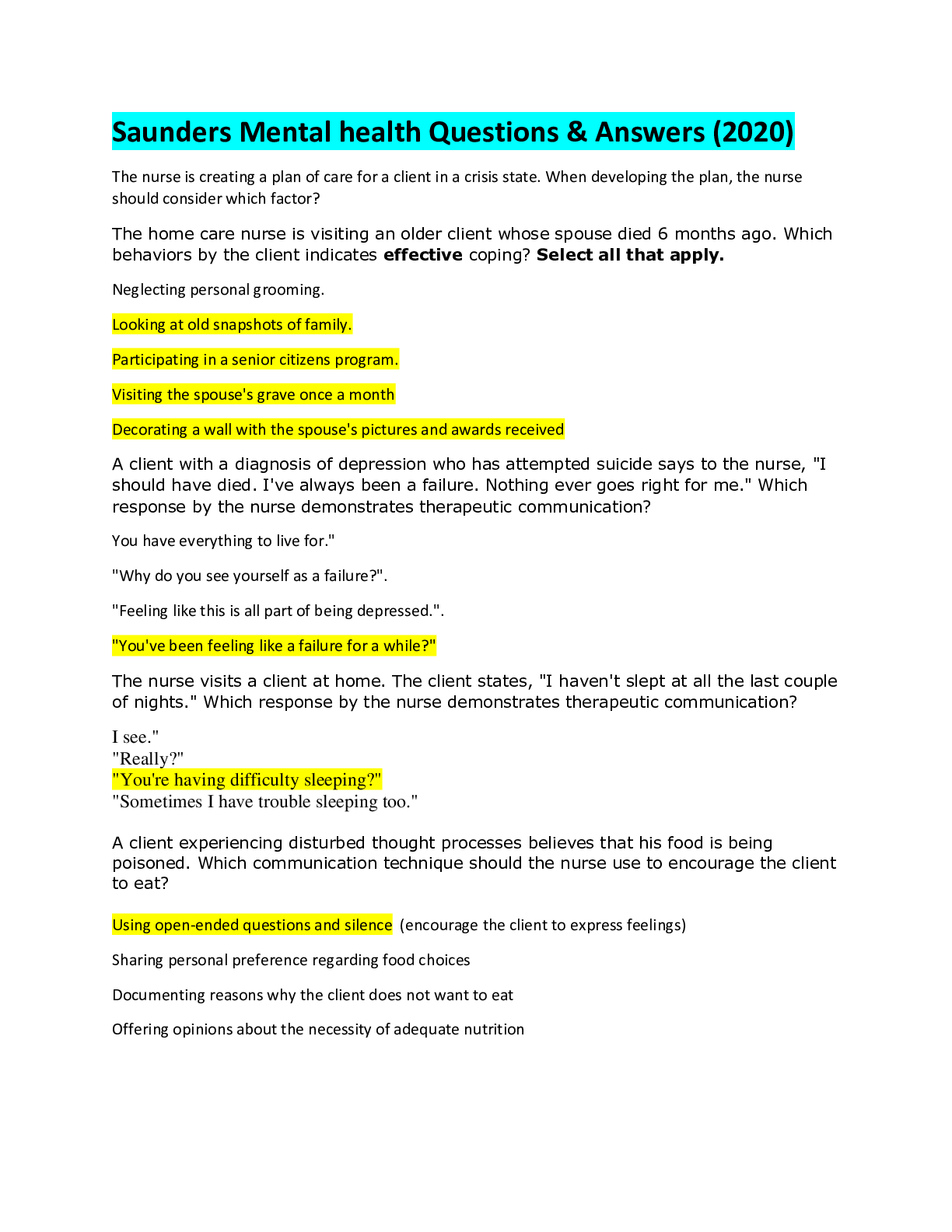
Reviews( 0 )
Document information
Connected school, study & course
About the document
Uploaded On
May 12, 2020
Number of pages
45
Written in
Additional information
This document has been written for:
Uploaded
May 12, 2020
Downloads
0
Views
517

